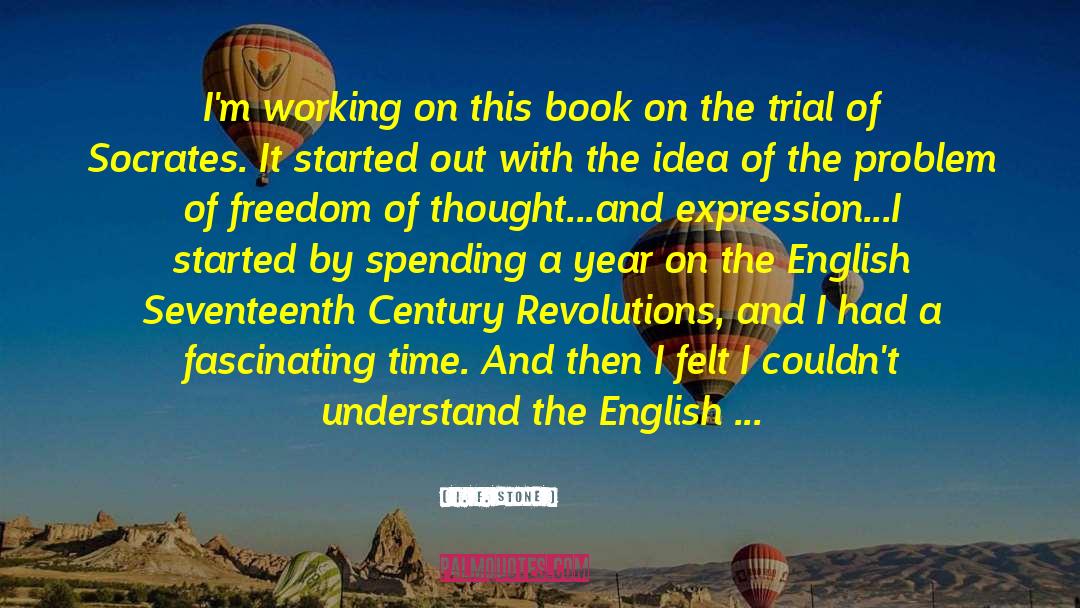Quotes About Seventeenth Century
Enjoy collection of 100 Seventeenth Century quotes. Download and share images of famous quotes about Seventeenth Century. Righ click to see and save pictures of Seventeenth Century quotes that you can use as your wallpaper for free.
We should have scant notion of the gardens of these New England colonists in the seventeenth century were it not for a cheerful traveller named John Josselyn, a man of everyday tastes and much inquisitiveness, and the pleasing literary style which comes from directness, and an absence of self-consciousness. ~ Alice Morse Earle
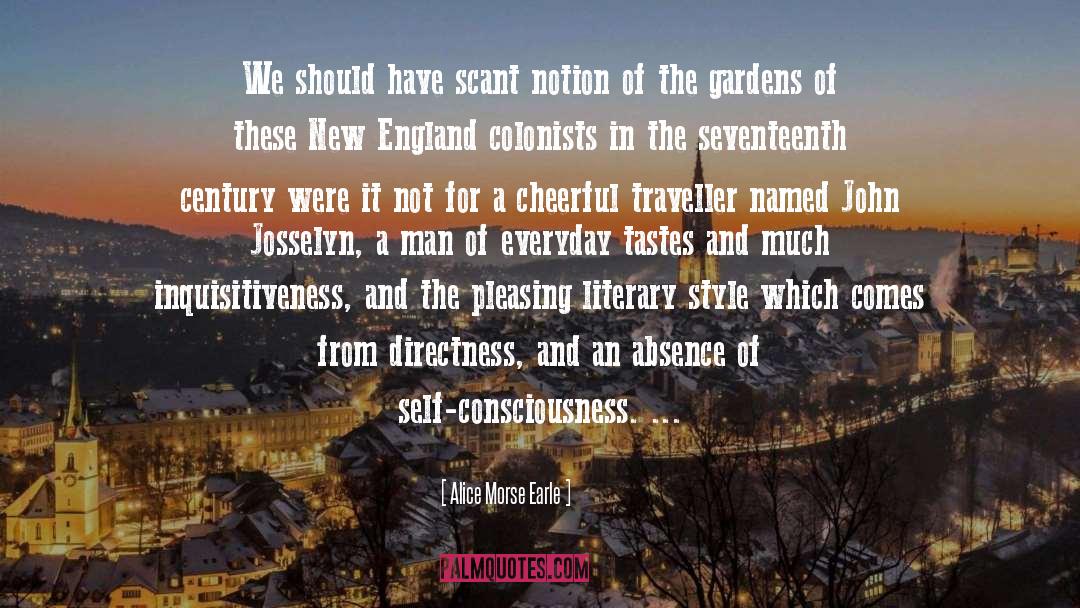
that was how plenty of people felt in 634 BC in Rome, as well, when they were convinced that the city was destined to collapse after 120 years of existence. It is how people have felt at countless points in history since then. Try searching Google's library of digitised manuscripts for the phrase 'these uncertain times', and you'll find that it occurs over and over, in hundreds of journals and books, in virtually every decade the database encompasses, reaching back to the seventeenth century. 'As a matter of fact,' Watts insisted, 'our age is no more insecure than any other. Poverty, disease, war, change and death are nothing new. ~ Oliver Burkeman
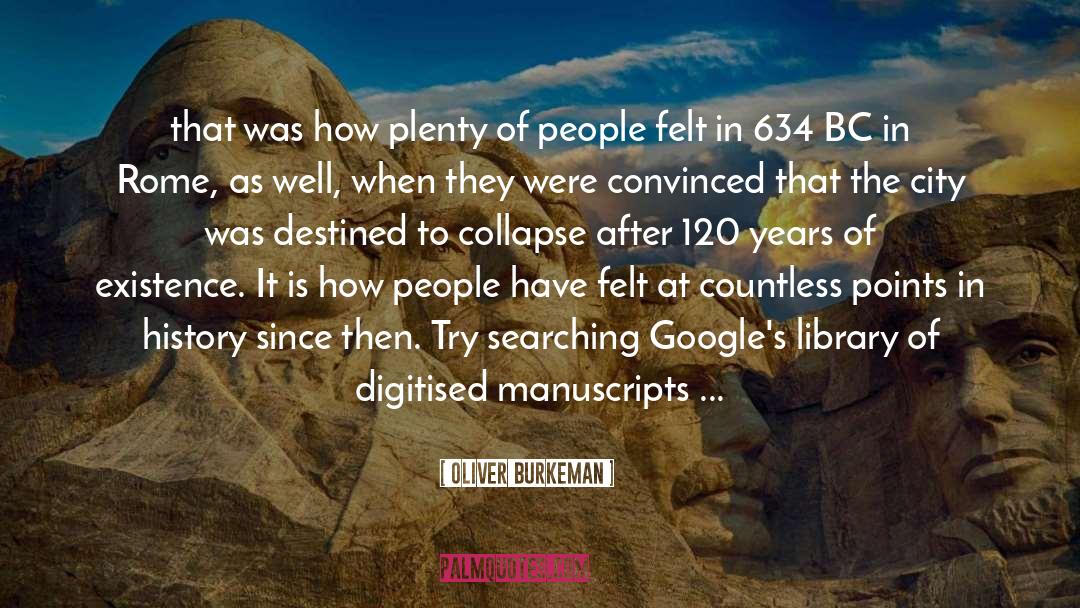
We also know how dangerous it is to simplify society by the use of examples in nature. However, many Americans still value the honey bee as a symbol of thrift and industry. This value seems to be one of the lingering philosophies from seventeenth-century England, in which the royal authorities and clergy dictated that the lower classes and unemployed should be "busy as bees" so they would not rebel. When the English began to label their own members of society as "drones," they privileged a new set of values based on work, thrift, and efficiency. The American Dream still seems to be based on these very values. And if somehow people do not attain the American Dream, we tend to think that they have not worked hard enough or did not save their money - in short, they are too much like drones. It could be argued that many American social policies - so conscious of work, labor, and time - are still based on the beehive model first adopted during the seventeenth century in England. For all its rhetoric of new opportunities, America still sees poverty as a sin, as if somehow the poor aren't thrifty or busy as bees. ~ Tammy Horn

The Greek word "nostalgia" derives from the root nostros, meaning "return home," and algia, meaning "longing." Doctors in seventeenth-century Europe considered nostalgia an illness, like the flu, mainly suffered by displaced migrant servants, soldiers, and job seekers, and curable through opium, leeches, or, for the affluent, a journey to the Swiss Alps. Throughout time, such feeling has been widely acknowledged. The Portuguese have the term saudade. The Russians have toska. The Czechs have litost. Others too name the feeling: for Romanians, it's dor, for Germans, it's heimweh. The Welsh have hiraeth, the Spanish mal de corazon. Many ~ Arlie Russell Hochschild

No seventeenth-century pedagogue would have publicly advised his disciple, as did Erasmus in his Dialogues, on the choice of a good prostitute. ~ Michel Foucault

This male-default bias goes back at least to the ancient Greeks, who kicked off the trend of seeing the female body as a 'mutilated male' body (thanks, Aristotle). The female was the male 'turned outside in'. Ovaries were female testicles (they were not given their own name until the seventeenth century) and the uterus was the female scrotum. The reason they were inside the body rather than dropped out (as in typical humans) is because of a female deficiency in 'vital heat'. The male body was an ideal women failed to live up to. ~ Caroline Criado Perez

Working quickly was the trick of it. When Samuel Pepys underwent a lithotomy - the removal of a kidney stone - in 1658, the surgeon took just fifty seconds to get in and find and extract a stone about the size of a tennis ball. (That is, a seventeenth-century tennis ball, which was rather smaller than a modern one, but still a sphere of considerable dimension.) ~ Bill Bryson

Most critics agree with the seventeenth-century printer who gave them to the world, that the Mutabilitie Cantos seem to be part of some following book of The Faerie Queene. ~ Janet Spens
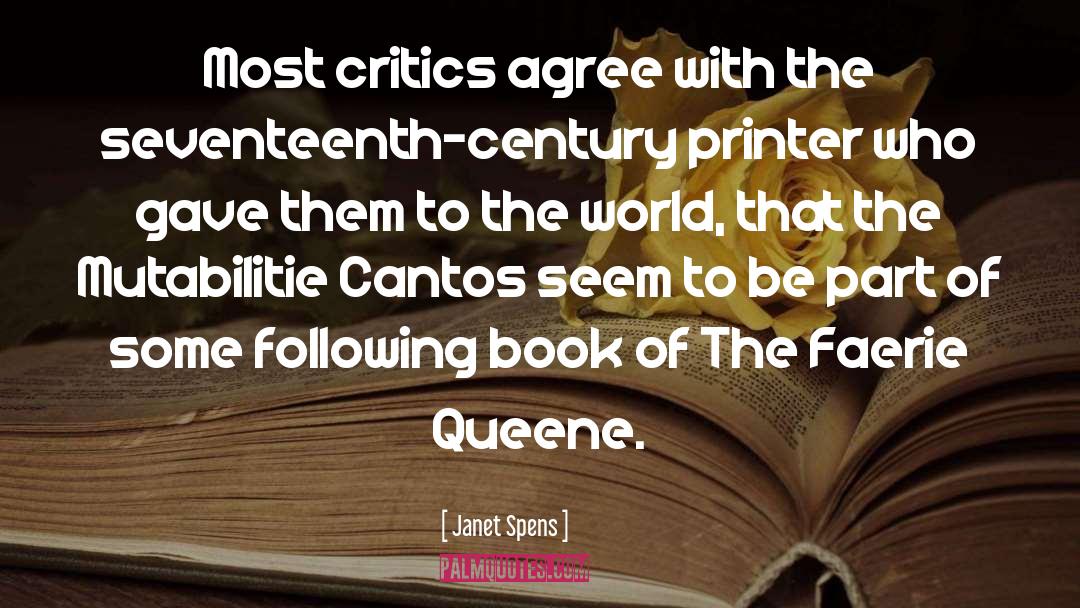
All three of the English types I have mentioned can, I think, be accounted for as the results of the presence of different cultures, existing side by side in the country, and who were the creation of the folk in ages distantly removed one from another. In a word, they represent specific " strata" of folk-imagination. The most diminutive of all are very probably to be associated with a New Stone Age conception of spirits which haunted burial-mounds and rude stone monuments. We find such tiny spirits haunting the great stone circles of Brittany. The "Small People," or diminutive fairies of Cornwall, says Hunt, are believed to be "the spirits of people who inhabited Cornwall many thousands of years ago. "The spriggans, of the same area, are a minute and hirsute family of fairies" found only about the cairns, cromlechs, barrows, or detached stones, with which it is unlucky to meddle." Of these, the tiny fairies of Shakespeare, Drayton, and the Elizabethans appear to me to be the later representatives. The latter are certainly not the creation of seventeenth-century poets, as has been stated, but of the aboriginal folk of Britain. ~ Lewis Spence

In the seventeenth century, the science of medicine had not wholly cut asunder from astrology and necromancy; and the trusting Christian still believed in some occult influences, chiefly planetary, which governed not only his crops but his health and life. ~ Alice Morse Earle
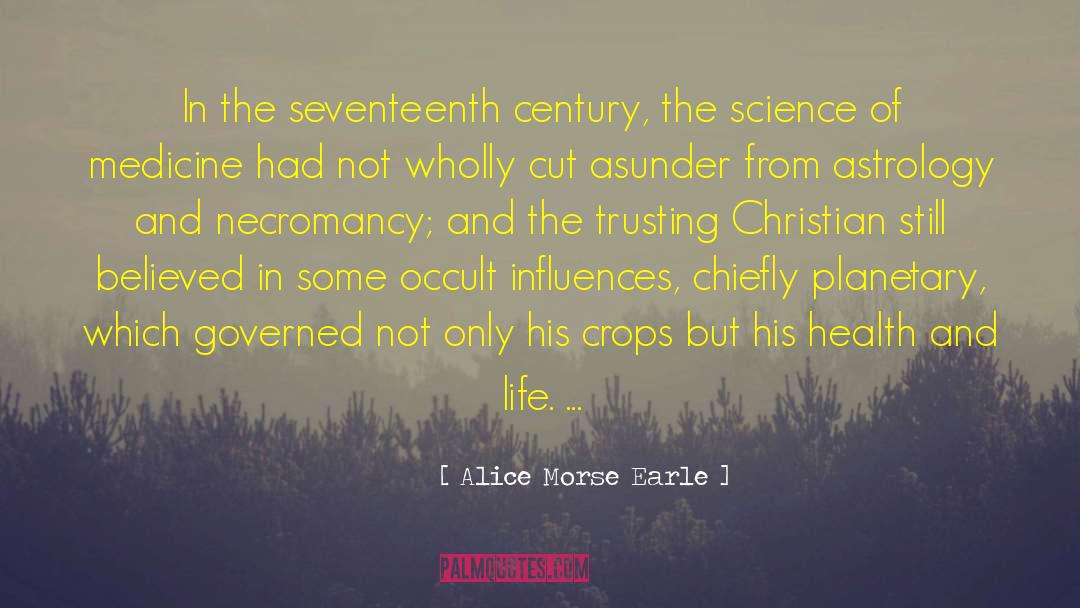
Randomisation is not a new idea. It was first proposed in the seventeenth century by John Baptista van Helmont, a Belgian radical who challenged the academics of his day to test their treatments like blood-letting and purging (based on 'theory') against his own, which he said were based more on clinical experience: 'Let us take out of the hospitals, out of the Camps, or from elsewhere, two hundred, or five hundred poor People, that have Fevers, Pleurisies, etc. Let us divide them into half, let us cast lots, that one half of them may fall to my share, and the other to yours … We shall see how many funerals both of us shall have. ~ Ben Goldacre

Henceforth the Cartesian surgical operation in which spirit and matter become totally separated dominated scientific and philosophic thought The domain of science was matter which was a pure "it" divorced completely from any ontological aspect other than pure quantity. Although there were protests here and there especially among English and German thinkers, this view became the very factor that determined the relationship between man and nature, scientifically and philosophically. Thus seventeenth-century rationalism is the unconscious background of all later scientific thought up to the present day. Whatever discoveries are made in the sciences and whatever changes are brought about in conceptions of time, space, matter and motion, the background of seventeenth-century rationalism remains. For this very reason, other interpretations of nature, especially the symbolic, have never been seriously considered and accepted. ~ Seyyed Hossein Nasr
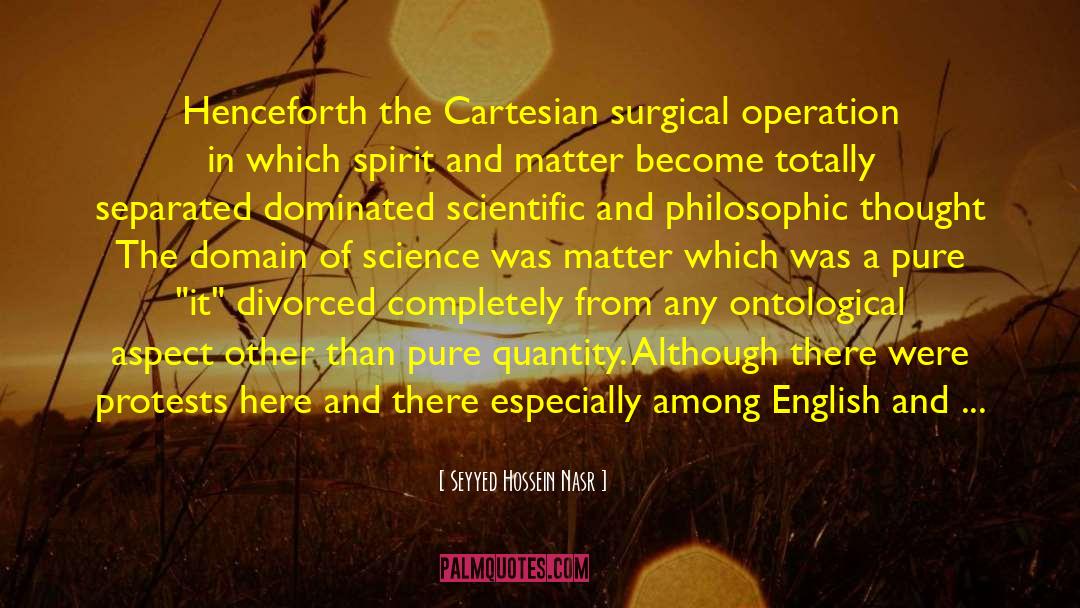
the seventeenth-century saint, Margaret Marie Alacoque, a French nun of Parayle-Monial, who founded the devotion to the Sacred Heart of Jesus. Margaret would deliberately eat cheese knowing that it made her vomit, and by her own admission she ate the vomit of sister nuns. ~ John Cornwell

Scottish operative lodges began in the seventeenth century to admit non-operative members as accepted or gentleman masons and that by the early eighteenth century in some lodges the accepted or gentleman masons had gained the ascendancy: those lodges became, in turn speculative lodges, whilst others continued their purely operative nature. The speculative lodges eventually combined to form the Grand Lodge of Scotland in 1736. ~ John Hamill

Hamlet is the human soul as it was, as it is, and as it will be. In conceiving this drama, Shakspeare overstepped the limit fixed even for genius. I can understand Homer and Dante, studied by the light of their epoch. I can comprehend that they could do what they did; but how an Englishman of the seventeenth century could foreknow psychosis, a science of recent growth, will be to me, in spite of my study of Hamlet, an everlasting mystery. Having ~ Henryk Sienkiewicz

The public execution did not re-establish justice; it reactivated power. In the seventeenth century, and even in the early eighteenth century, it was not, therefore, with all its theatre of terror, a lingering hang-over from an earlier age. Its ruthlessness, its spectacle, its physical violence, its unbalanced play of forces, its meticulous ceremonial, its entire apparatus were inscribed in the political functioning of the penal system. ~ Michel Foucault
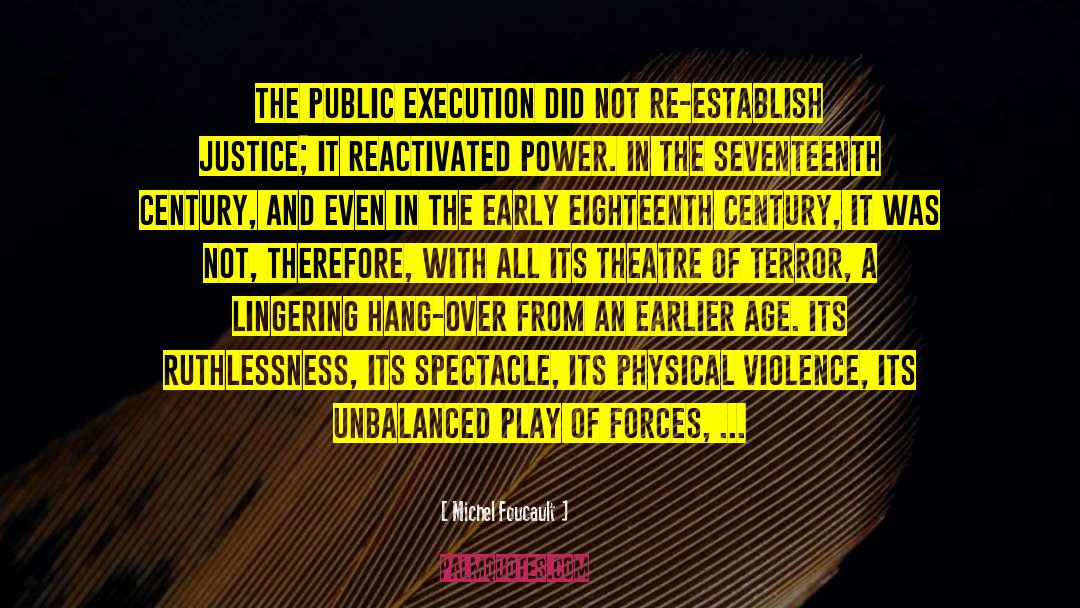
The widest cause of secularization may be the steady change of thinking so that there is the expectation that reason and a consideration of cause and effect will help with explanations. Supernatural power began to be removed from explanations of the process of life or society in the seventeenth century, and although there may be a nod towards astrology or the crossed finger today, superstition is not seriously used in decision making ...
Scientific thinking, which similarly developed in the seventeenth century, has been influential in bringing this change. We now see that tornadoes and earthquakes have rational explanations in terms of climatology and seismology rather than as divine punishments. Most people when deciding whether to take a new job, embark on a divorce, or simply plan a holiday will not seek divine guidance, but rather discuss with themselves or others the issues of cause and effect. ~ Jim Herrick
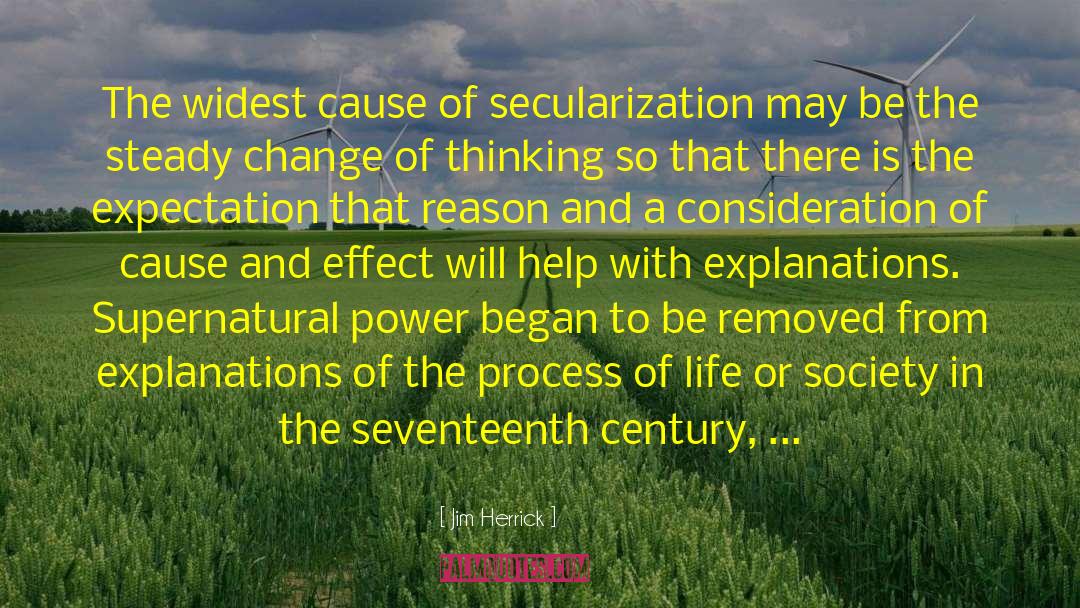
The seventeenth century is everywhere a time in which the state's power over everything individual increases, whether that power be in absolutist hands or may be considered the result of a contract, etc. People begin to dispute the sacred right of the individual ruler or authority without being aware that at the same time they are playing into the hands of a colossal state power. ~ Jacob Burckhardt
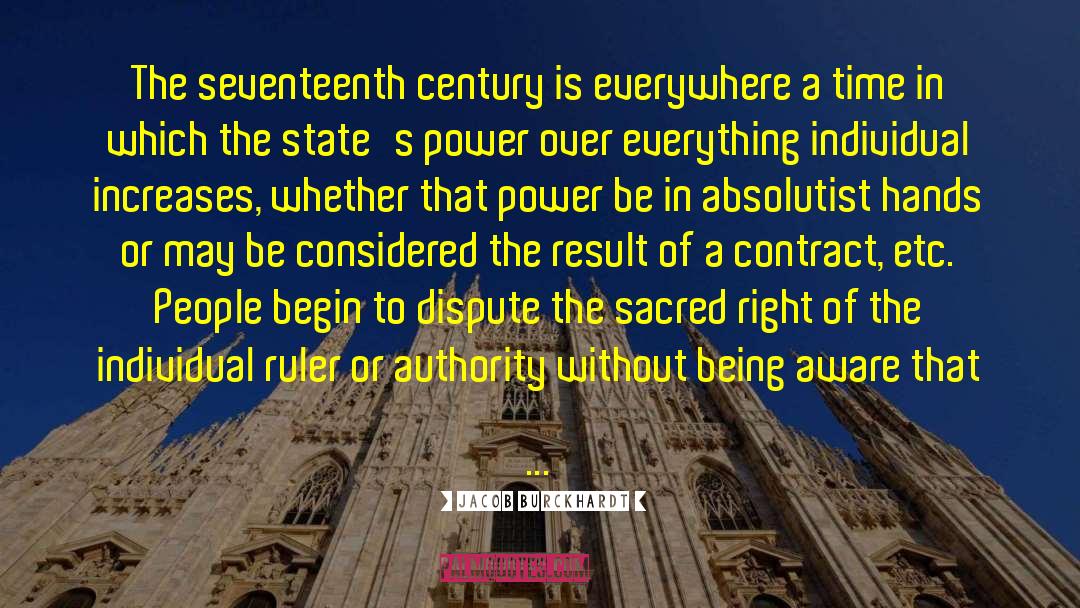
Years ago atheism was an individual phenomenon; today atheism is social, the atheist who once was a curiosity, is now a component part of some of the governments of the world. Once men quarreled because they wanted God worshipped in a certain way; now they quarrel because they do not want God worshipped at all. The wars of religion of the seventeenth century have become the wars against religion of the twentieth century. ~ Fulton J. Sheen
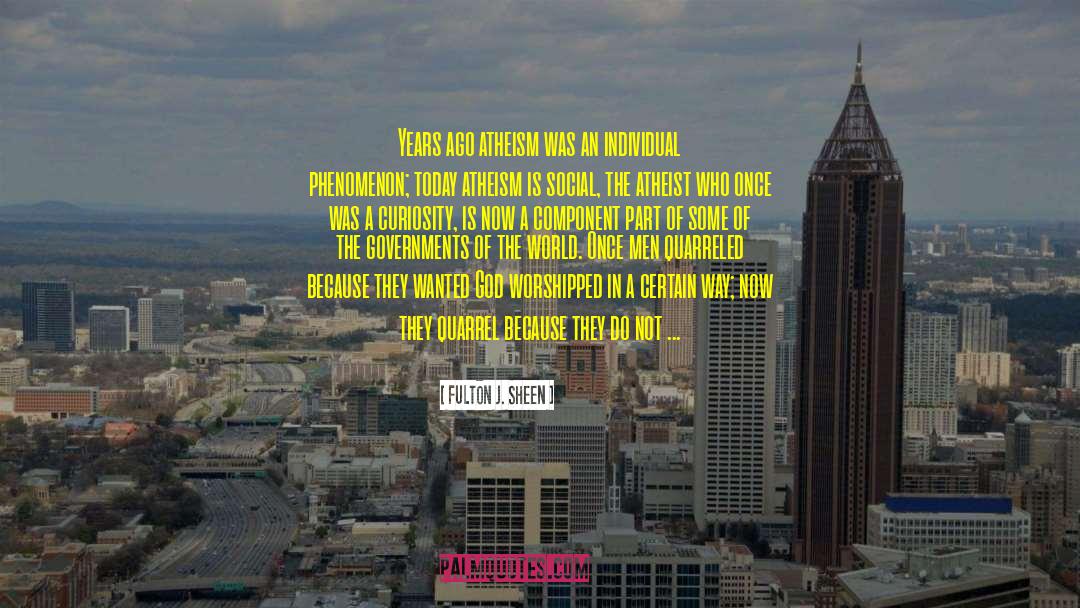
A seventeenth-century house tends to be short on frills like hallways and closets; you must improvise. ~ John Updike

It was a strange combination to absorb - the everyday concerns of the town doctor stuck in the middle of a discussion of his early days in seventeenth-century London. ~ Stephenie Meyer

…in Pliny's time, it was believed that only the blood of a newly sacrificed kid, or lamb, could shatter a diamond. Pliny wondered - as many did until the seventeenth century when this 'fact' was still being quoted as a gemological curiosity - how anyone could have thought to experiment with such a thing … He did not realize that the story was probably a metaphor, perhaps with the same root as the Christian symbol of the Lamb of God. A diamond is the hardest substance; a sacrificed lamb or goat the most innocent. The only way to overcome harshness and brutality, the imagery suggests, is with love. ~ Victoria Finlay
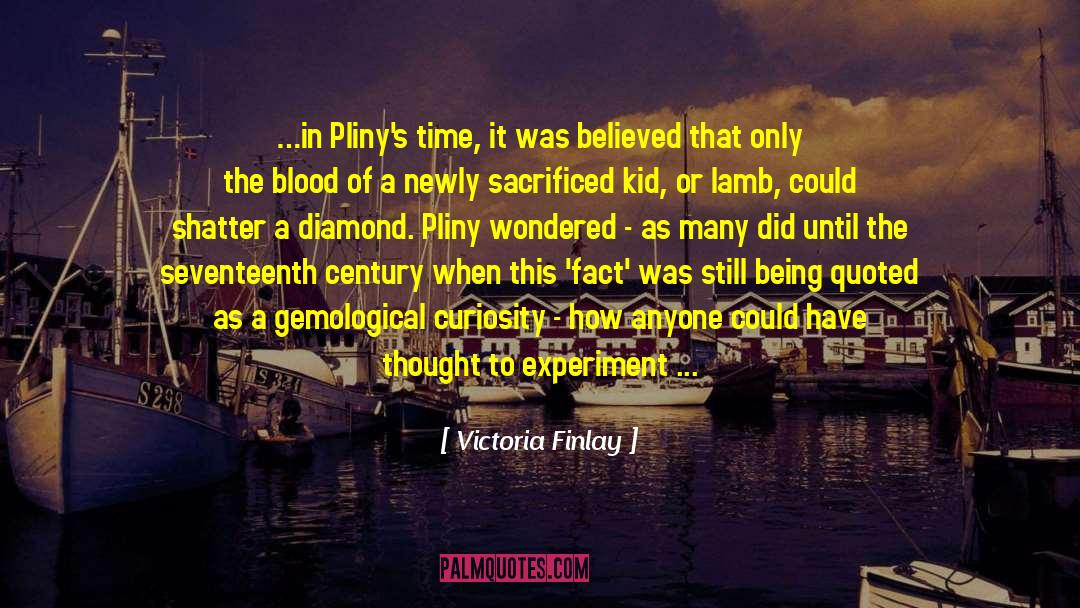
I wish that in order to secure his party's nomination, a presidential candidate would be required to point at the sky and name all the stars; have the periodic table of the elements memorized; rattle off the kings and queens of Spain; define the significance of the Gatling gun; joke around in Latin; interpret the symbolism in seventeenth-century Dutch painting; explain photosynthesis to a six-year-old; recite Emily Dickenson; bake a perfect popover; build a shortwave radio out of a coconut; and know all the words to Hoagy Carmichael's "Two Sleepy People", Johnny Cash's "Five Feet High and Rising", and "You Got the Silver" by the Rolling Stones ... What we need is a president who is at least twelve kinds of nerd, a nerd messiah to come along every four years, acquire the Secret Service code name Poindexter, install a Revenge of the Nerds screen saver on the Oval Office computer, and one by one decrypt our woes. ~ Sarah Vowell

Afterwards, we don't head straight back to work. Instead, we stop at McDonald's. Kristy gets a Happy Meal. Cora gets like four pies, which doesn't exactly seem like a healthy, balanced meal to me, but she's not exactly a healthy, balanced young lady. I get a couple of Big Macs and some fries. Arthur stares at the menu the way a time-traveling seventeenth century Puritan would watch a Lady Gaga music video. ~ Hannah Johnson

Few can contemplate without a sense of exhilaration the splendid achievements of practical energy and technical skill, which, from the latter part of the seventeenth century, were transforming the face of material civilization, and of which England was the daring, if not too scrupulous, pioneer. ~ E.F. Schumacher

. . . to voice private sympathies in the context of an official proceeding would require Washington to become, in his own words, 'lost to my own character.' Here, in this reference to character, Washington hit upon the essential difference between himself and Arnold. Washington's sense of right and wrong existed outside the impulsive demands of his own self-interest. Rules mattered to Washington. Even though Congress had made his life miserable for the last four years, he had found ways to do what he considered best for his army and his country without challenging the supremacy of civil authority. To do otherwise, to declare himself, like the seventeenth-century English revolutionary Oliver Cromwell, master of his army and his country, would require him to become 'lost to my own character.' For Arnold, on the other hand, rules were made to be broken. He had done it as a pre-Revolutionary merchant and he had done it as military governor of Philadelphia. This did not make Arnold unusual. Many prominent Americans before and since have lived in the gray area between selfishness and altruism. What made Arnold unique was the god-like inviolability he attached to his actions. He had immense respect for a man like Washington, but Arnold was, in the end, the leading person-age in the drama that was his life. Not lost to his own character, but lost in it, Arnold did whatever Arnold wanted. ~ Nathaniel Philbrick

Two historical figures play prominent roles in this book: a pair of priests who lived centuries apart but who were tied together by fate. During the seventeenth century, Father Athanasius Kircher was known as the Leonardo da Vinci of the Jesuit Order. ~ James Rollins

It was the seventeenth-century English who gave corned beef its name - corns being any kind of small bits, in this case salt crystals. ~ Mark Kurlansky

In his History of the Peloponnesian War, Thucydides adduces a change in language as a major factor in Athens's descent from dysfunctional democracy through demagoguery into tyranny and anarchy: people began to define things in any way they pleased, he says, and the "normally accepted meaning of words" broke down. In his account of the Catiline crisis in republican Rome, Sallust has Cato the Younger identify the misuse of language - specifically the scission of word and meaning - as the underlying cause of the threat to the state. Society, Cato says, has lost the "vera vocabula rerum," literally, the "true names of things."18 In seventeenth-century England, Thomas Hobbes lived through a civil war he believed had been caused in significant measure by a war of words about religion - spread through the pervasive pamphleteering that printing had made possible - that had fatally weakened the linguistic common ground on which an ordered state depends. ~ Mark John Thompson
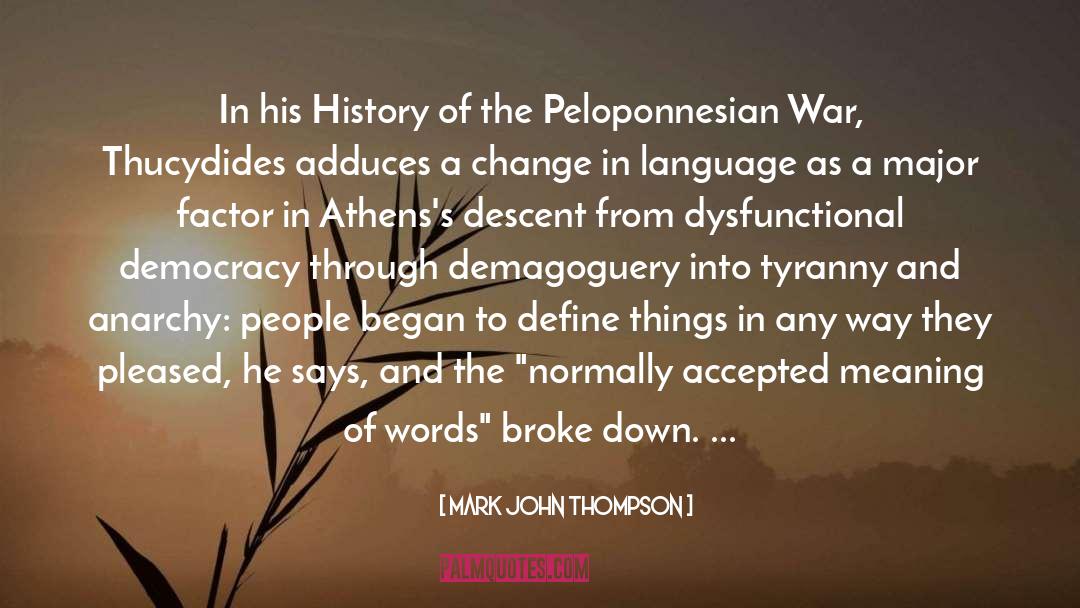
Now you who so fear the word an-arche, remember! the whole combat of the seventeenth century, of which you are justly proud, and to which you never tire of referring, was waged for the sole purpose of realizing anarchism in the realm of thought. It was not an easy struggle, – this battle of the quiet thinkers against those who held all the power, and all the force of numbers, and all of the strength of tortures! It was not easy for them to speak out of the midst of faggot flames, "We believe differently, and we have the right". But on their side stood Truth! And there lies more inequality between her and Error, more strength for Truth, more weakness for Falsehood, than all the fearful disparity of power that lies between the despot and the victim. So theirs was the success. ~ Emma Goldwater
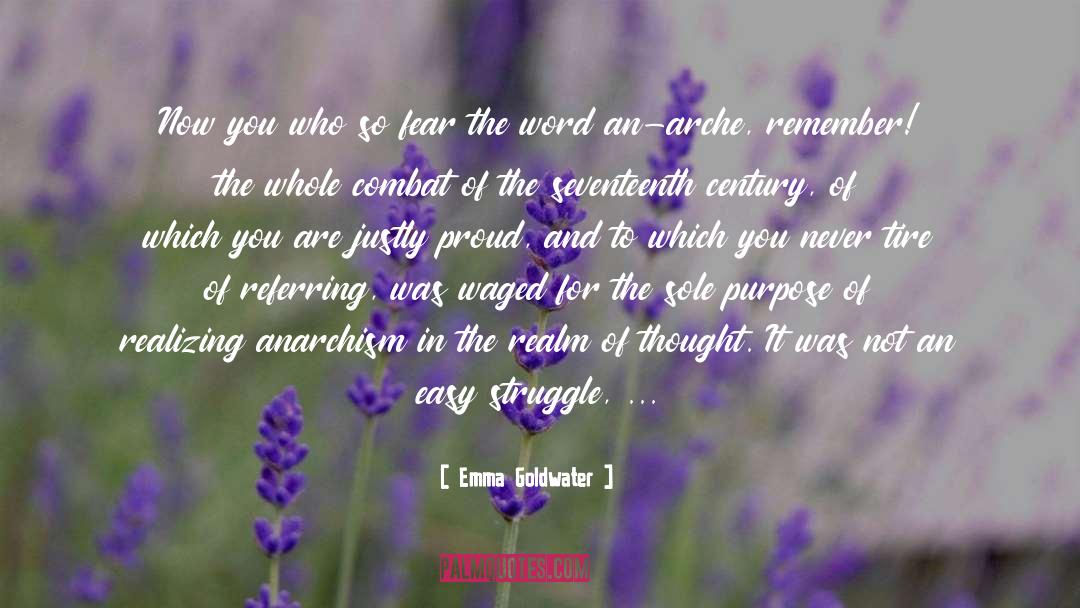
The poetry from the eighteenth century was prose; the prose from the seventeenth century was poetry. ~ David Hare

My taste runs to hourglasses, maps, seventeenth-century typefaces, etymologies, the taste of coffee, and the prose of Robert Louis Stevenson. ~ Jorge Luis Borges
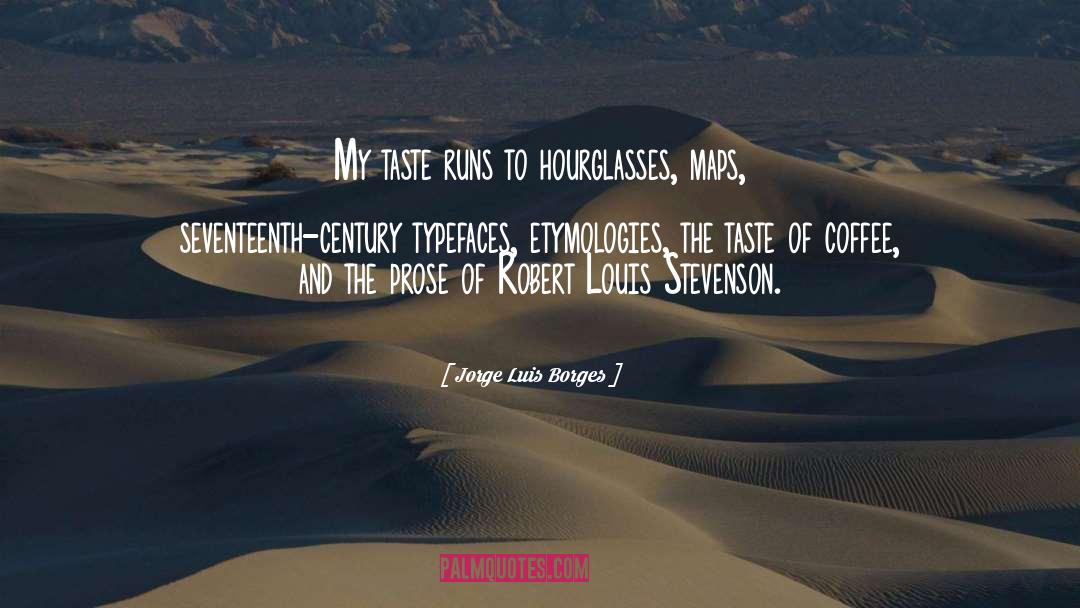
The art of the alchemist, whether spiritual or physical, consists in completing the work of perfection, bringing forth and making dominant, as it were, the "latent goldness" which "lies obscure" in metal or man. The ideal adept of alchemy was therefore an "auxiliary of the Eternal Goodness." By his search for the "Noble Tincture" which should restore an imperfect world, he became a partner in the business of creation, assisting the Cosmic Plan. Thus the proper art of the Spiritual Alchemist, with whom alone we are here concerned, was the production of the spiritual and only valid tincture or Philosopher's Stone; the mystic seed of transcendental life which should invade, tinge, and wholly transmute the imperfect self into spiritual gold. That this was no fancy of seventeenth-century allegorists, but an idea familiar to many of the oldest writers upon alchemy - whose quest was truly a spiritual search into the deepest secrets of the soul - is proved by the words which bring to an end the first part of the antique "Golden Treatise upon the Making of the Stone," sometimes attributed to Hermes Trismegistus. "This, O Son," says that remarkable tract, "is the Concealed Stone of Many Colours, which is born and brought forth in one colour; know this and conceal it . . . it leads from darkness into light, from this desert wilderness to a secure habitation, and from poverty and straits to a free and ample fortune. ~ Evelyn Underhill
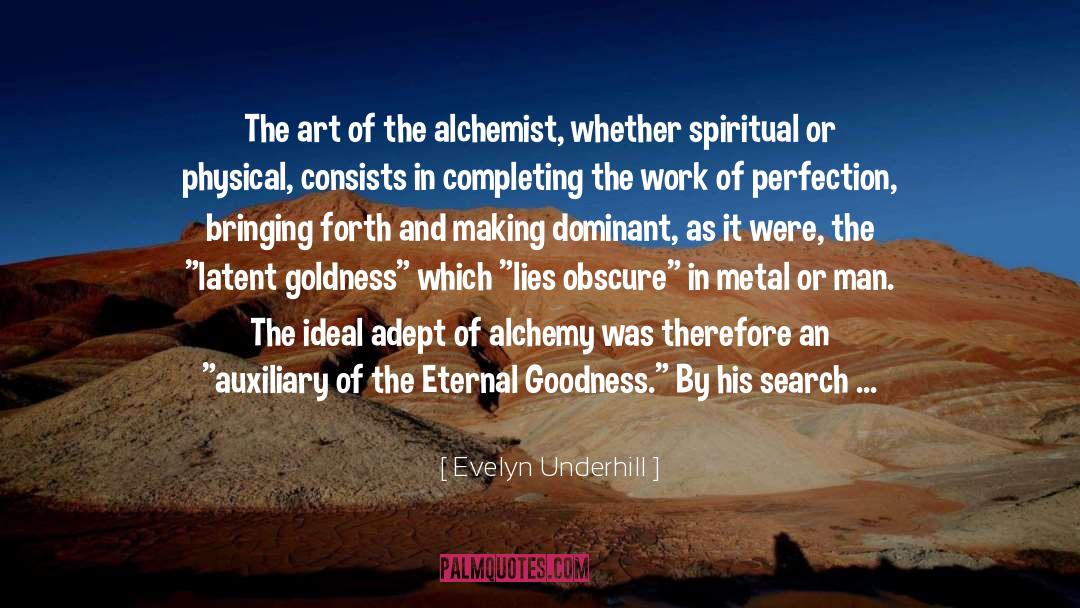
They're not tourists, either, they're nothing like the gawkers and brayers in a place like Times Square, but they don't live here, they live in Jersey or Westchester, they're burghers right out of seventeenth-century Amsterdam, they cross Broadway as if they fucking own it, they think they look rakish, they think they're creatures of the night, they have neighbors whom they consider burghers because they don't like driving in New York, because they'd rather stay home (right now, the woman in the fringed pashmina shawl, the one walking arm-in-arm with Cowboy Boots, explodes in laughter, a great smacking hoot of a laugh, a three-martinis laugh, audible for a block or so), while the residents of downtown Manhattan, the ones who survive the days here, walk more modestly, certainly more quietly, more like penitents, because it's almost impossible to maintain a sense of hubris when you live here, you're too constantly confronted by the rampant otherness of others; hubris is surely much more attainable when you've got a house and a lawn and an Audi, when you understand that at the end of the world you'll get a second's more existence because the bomb won't be aimed at you, the shock wave will take you out but you're not anybody's main target, you've removed yourself from the kill zone, no one gets shot where you live, no one gets stabbed by a random psychopath, the biggest threat to your personal, ongoing security is the possibility that the neighbor's son will break in and steal a ~ Michael Cunningham
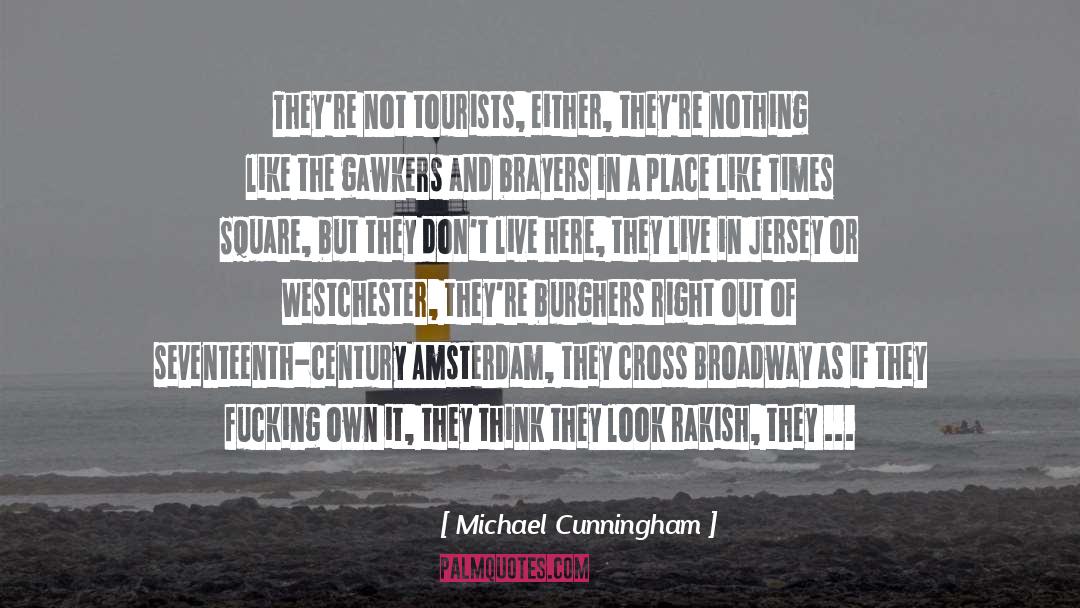
I was recently told, 'You're a liar!' when I said to somebody I walked down the spine of the Andes. Every Spaniard in the sixteenth, seventeenth century did that. The idea that somebody could just walk! He can jog perhaps in the morning, but he can't walk anywhere! The world has become inaccessible because we drive there. ~ Ivan Illich

A weekday edition of The New York Times contains more information than the average person was likely to come across in a lifetime in seventeenth-century England ~ Richard Saul Wurman

Josh isn't in love with me and I'm not in love with him."
"Sell it to someone who's buying, Sunshine. Have you seen the way he looks at you?" I've seen the way he looks at me but I don't know what it means. "Like you're a seventeenth-century, hand-carved table in mint condition. ~ Katja Millay

Flitch, a former tailor who, in the seventeenth century, had founded the Hobblers, a religious sect named for the peculiar shackled gait they adopted as they paced out their prayers. The Hobblers' beliefs seemed to be based largely on such novel ideas as that heaven was handily located six miles above the earth's surface, and that Nicodemus Flitch had been appointed personally by God as His mouthpiece and, as such, was licensed to curse souls to eternity, whenever he felt like it. ~ Alan Bradley
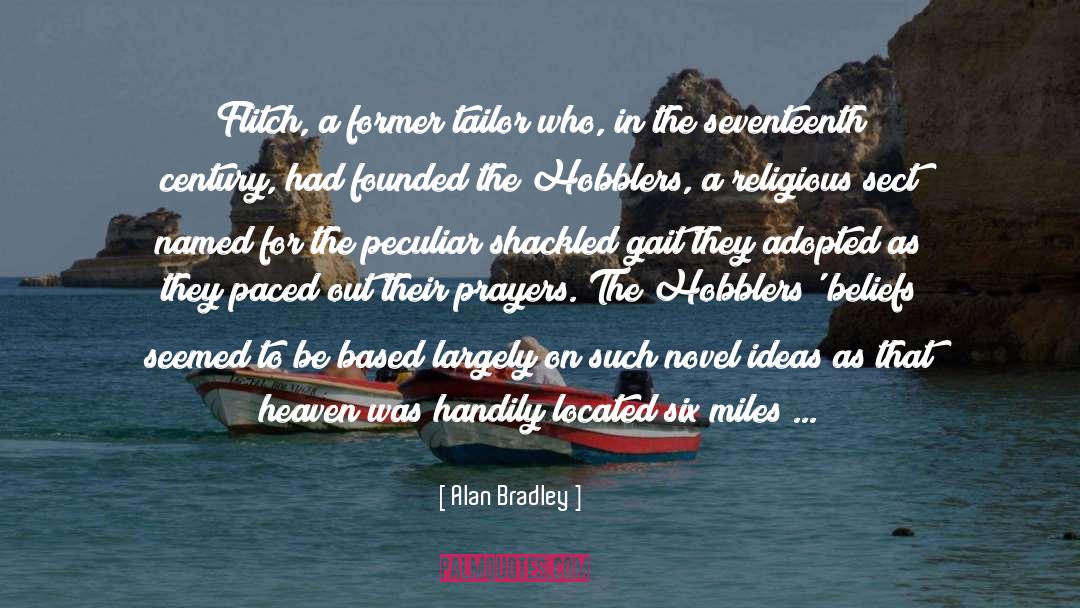
In the seventeenth century, it was held by some that inside a human sperm there was a minute human being - a homunculus - that was planted inside the womb. Development consisted of the miniature homunculus enlarging and passing through birth and on to maturity-just like inflating a balloon. ~ John Tyler Bonner
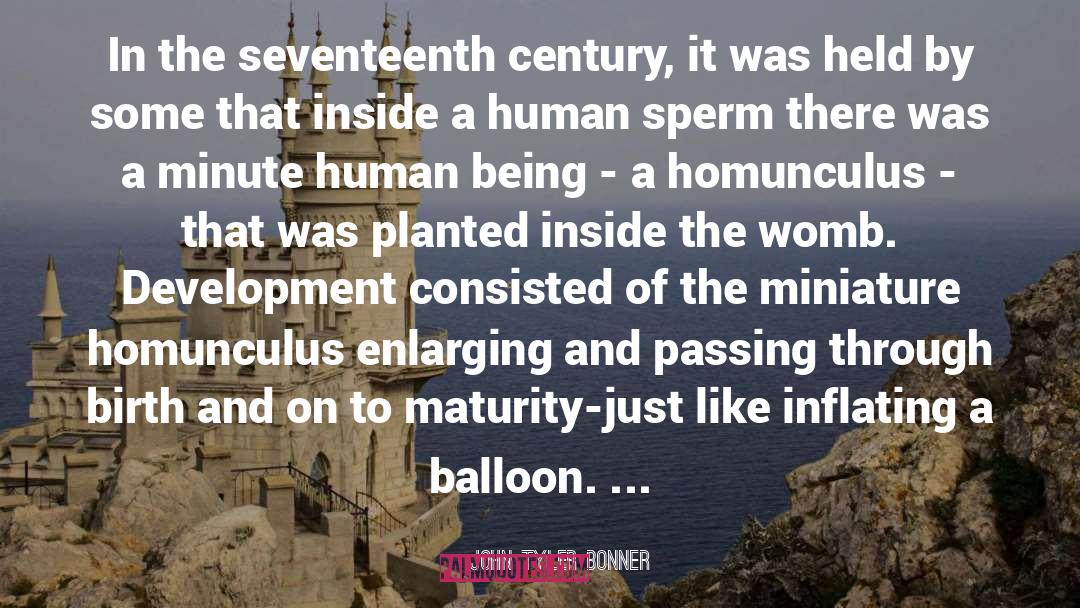
Constancy will always be the genius of love, the indication of that strength which constitutes the poet. A man should possess all women in his wife, like those squalid poetasters of the seventeenth century who made fair Irises and dazzling Chloes of their lowly Manons. ~ Honore De Balzac
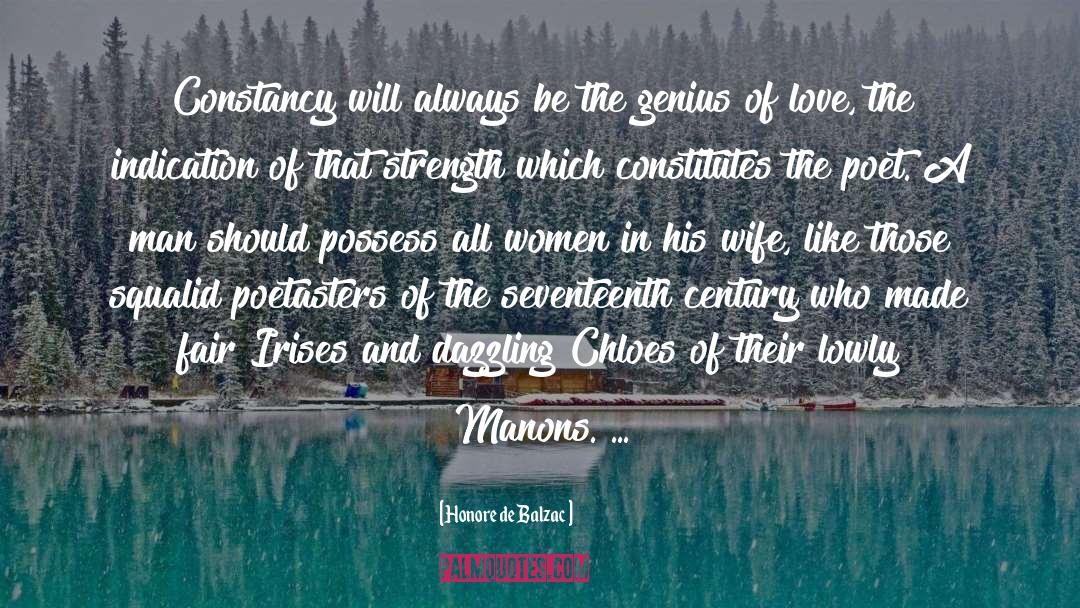
The earliest surviving manuscript containing Artephius' 'Ars Sintrillia' is from the seventeenth century, titled 'Artetti ac Mininii Apologia in Artem Magicam' under the heading 'De Scientia Praeteritorum Praesentium ac Futuorum'. This describes the use of three vases of different materials filled with water, wine and oil in which there are semi-precious stones. These are arranged in several ways with candles, and by the reflection of the rays of the sun, moon and stars into the liquids from several instruments, including a sword, make possible various kinds of divination, especially knowledge of the past, present and future ~ Nicholas Clulee

On sober reflection, I find few reasons for publishing my Italian version of an obscure, neo-Gothic French version of a seventeenth century Latin edition of a work written in Latin by a German Monk toward the end of the fourteenth century ... First of all, what style should I employ? ~ Umberto Eco

The force of originality "that made Donne so potent an influence in the seventeenth century makes him now at once for us, without his being the less felt as of his period, contemporary - obviously a living poet in the most important sense." In "The Good-Morrow" Leavis said that ~ John Donne

For some of the things that plagued the seventeenth-century New Englander we have modern-day explanations. For others we do not. We have believed in any number of things - the tooth fairy, cold fusion, the benefits of smoking, the free lunch - that turn out not to exist. We all subscribe to preposterous beliefs; we just don't know yet which ones they are. We too have been known to prefer plot to truth; to deny the evidence before us in favor of the ideas behind us; to do insane things in the name of reason; to take that satisfying step from the righteous to the self-righteous; to drown our private guilts in a public well; to indulge in a little delusion. We have all believed that someone had nothing better to do than spend his day plotting against us. The seventeenth-century world appeared full of inexplicables, not unlike the automated, mind-reading, algorithmically enhanced modern one. ~ Stacy Schiff

Female prophecy must be situated in the crisis of reproduction in the middle of the seventeenth century. This was the peak period for the criminalization of women in England and throughout Europe, as prosecutions for infanticide, abortion, and witchcraft reached their highest rate. It was also the period in which men began to wrest control of reproduction from women (male midwives appeared in 1625 and forceps soon thereafter); previously, "childbirth and the lying-in period were a kind of ritual collectively staged and controlled by women, from which men were usually excluded." Since the ruling class had begun to recognize its interest in increased fecundity, "attention was focussed on the 'population' as fundamental category for economic and political analysis." The simultaneous births of modern obstetrics and modern demography were responses to this crisis. Both, like the witchcraft prosecutions, sought to rationalize social reproduction in a capitalist context - that is, as the breeding of labor power. A recurring motif in the ruling-class imagination was intercourse between the English witch and the "black man" - a devil or imp. The terror was not limited to an imaginary chamber of horrors; it was an actuality of counterevolution. ~ Peter Linebaugh
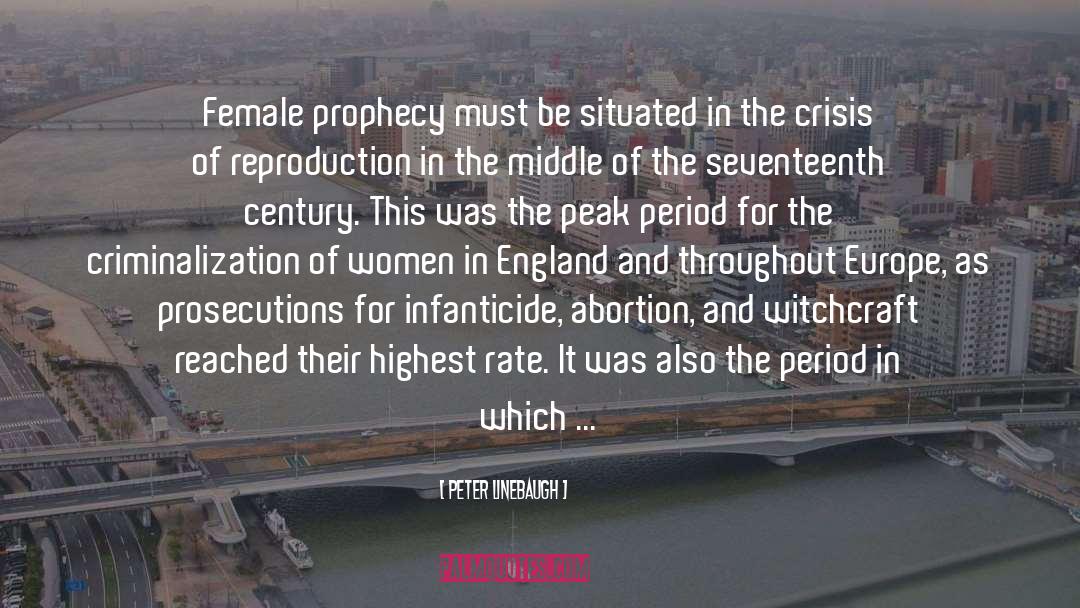
The true violin did not appear until about the year 1550. It did not reach its eminent position in the musical world until the late seventeenth century. ~ Bill Ballantine
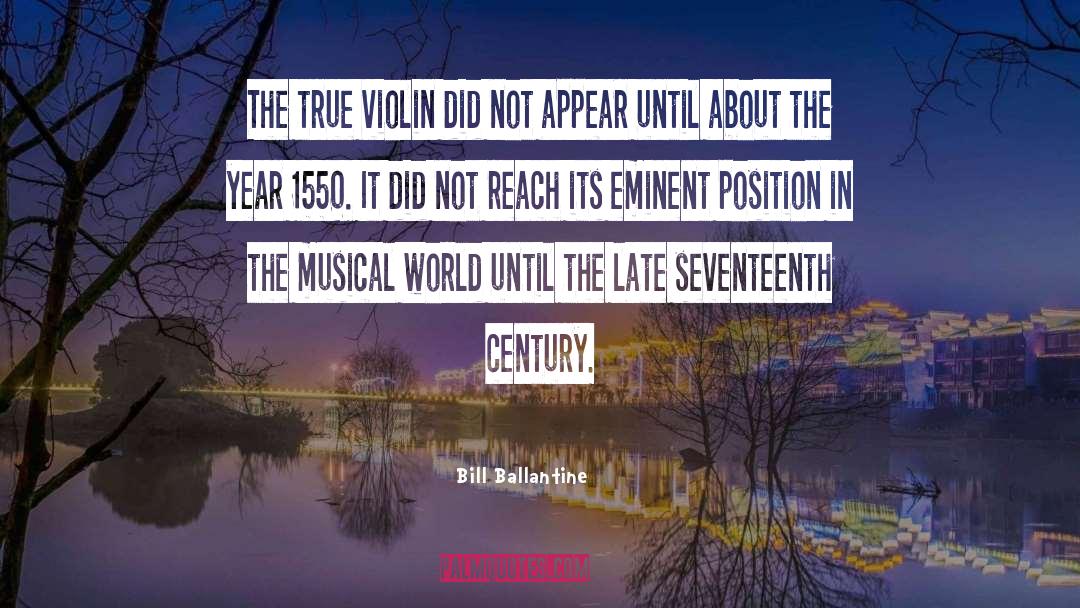
ACCOUNTABILITY TODAY As noted in the first chapter, the failure of democracy to consolidate itself in many parts of the world may be due less to the appeal of the idea itself than to the absence of those material and social conditions that make it possible for accountable government to emerge in the first place. That is, successful liberal democracy requires both a state that is strong, unified, and able to enforce laws on its own territory, and a society that is strong and cohesive and able to impose accountability on the state. It is the balance between a strong state and a strong society that makes democracy work, not just in seventeenth-century England but in contemporary developed democracies as well. ~ Francis Fukuyama
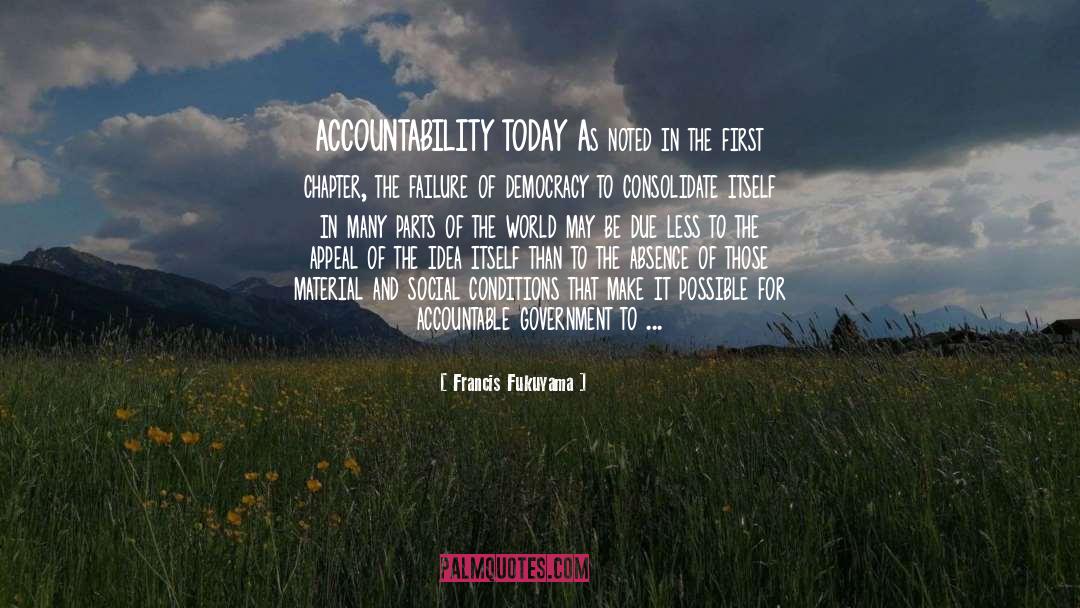
I have read or been told that in a book of etiquette of the seventeenth century the very first rule forbids you to tell your dreams to other people, since they cannot possibly be of interest to them. ~ Isak Dinesen
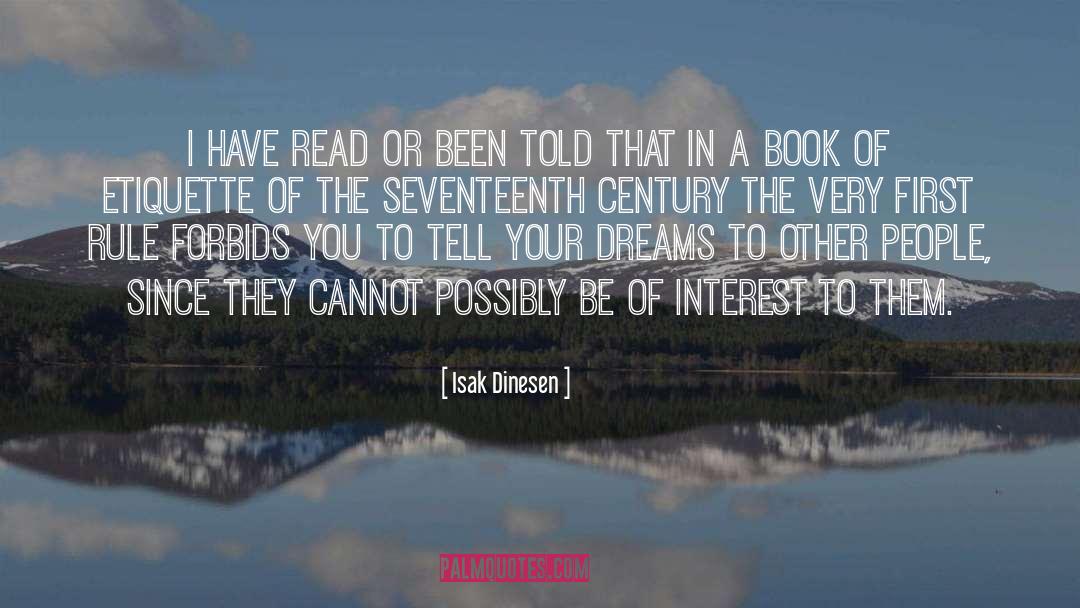
When you think about Puritanism, you must begin by getting rid of the slang term 'Puritanism' as applied to Victorian religious hypocrisy. This does not apply to seventeenth-century Puritanism. ~ Leland Ryken

The great correspondent of the seventeenth century Madame de Sevigne counseled, "Take chocolate in order that even the most tireome company seem acceptable to you," which is also sound advice today! ~ Barrie Kerper
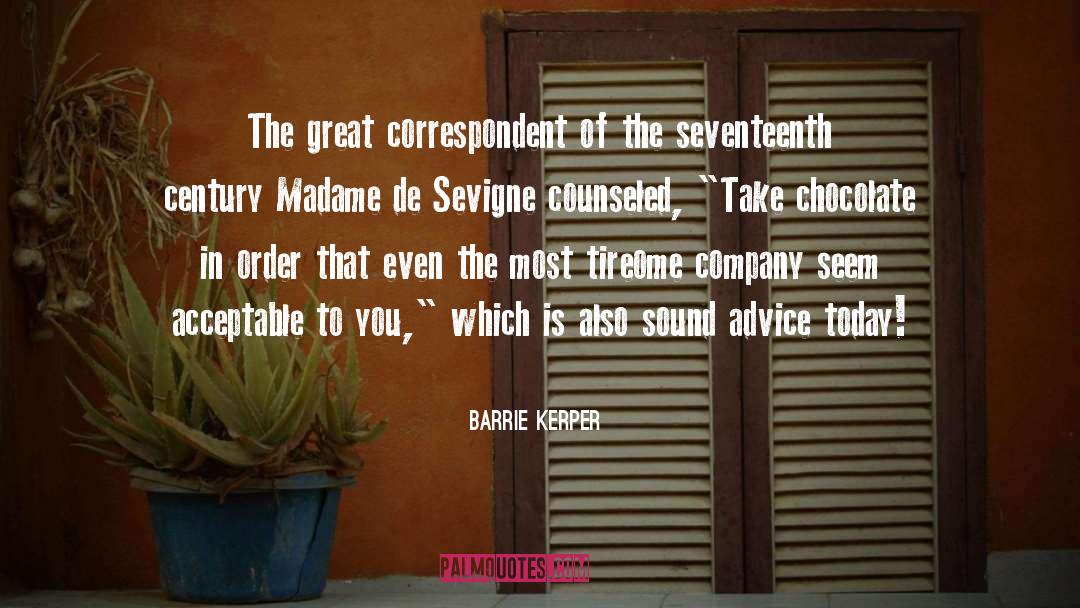
Timothy's eyes kind of flashed with recognition, as if the seventeenth-century ghost who lived inside him had suddenly awakened. ~ Kevin Wilson
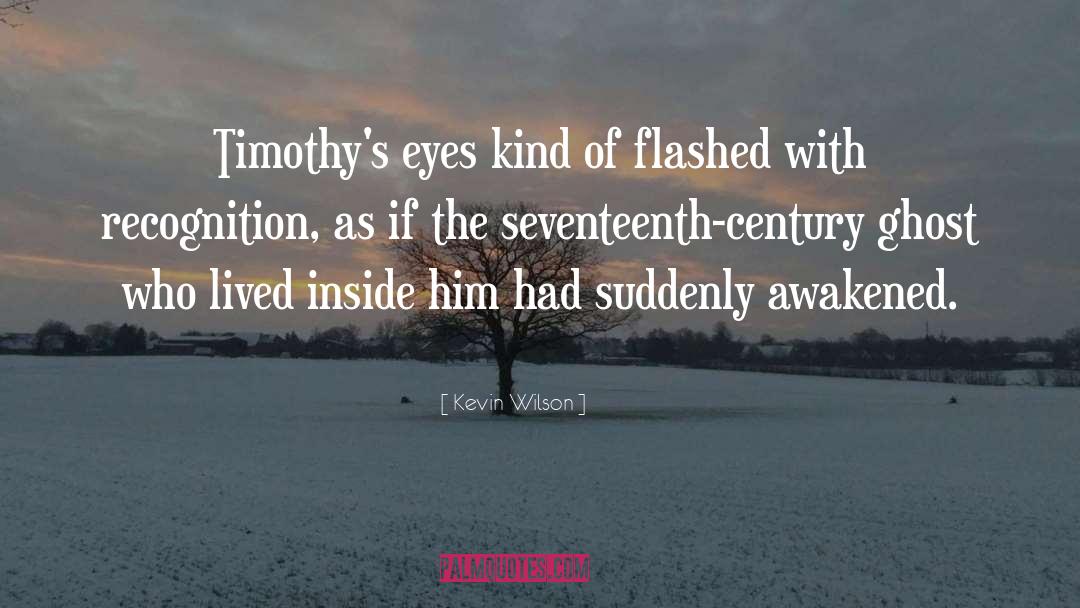
I would be researching seventeenth-century garden design or I would be doing something with Pepys, but I just kept using all of it to write about Margaret Cavendish. It took me a long time to realize that I just wanted to write a book about her. Years. ~ Danielle Dutton

Allan thought it sounded unnecessary for the people in the seventeenth century to kill each other. If they had only been a little patient they would all have died in the end anyway. Julius said that you could say the same of all epochs ~ Jonas Jonasson

Until the seventeenth century there was no concept of evidence with which to pose the problem of induction! ~ Ian Hacking
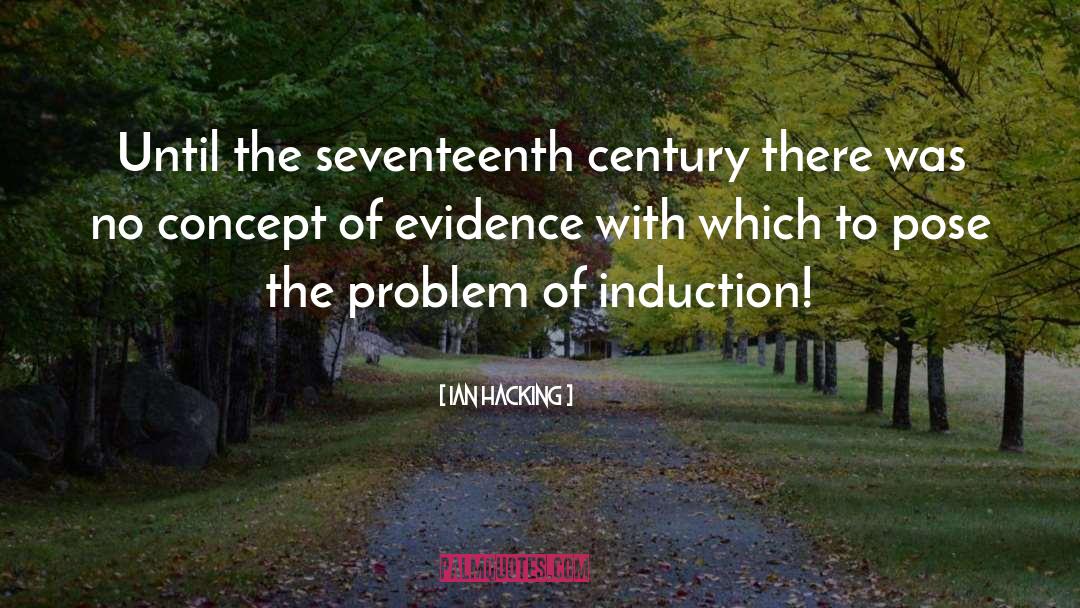
And it'd be very hard to make up something as strange as the Dutch tulipmania in the seventeenth century, for example. Or the mysterious case of Thomas Clapper. Or the entire civic history of Seattle, Washington. ~ Stephen Briggs
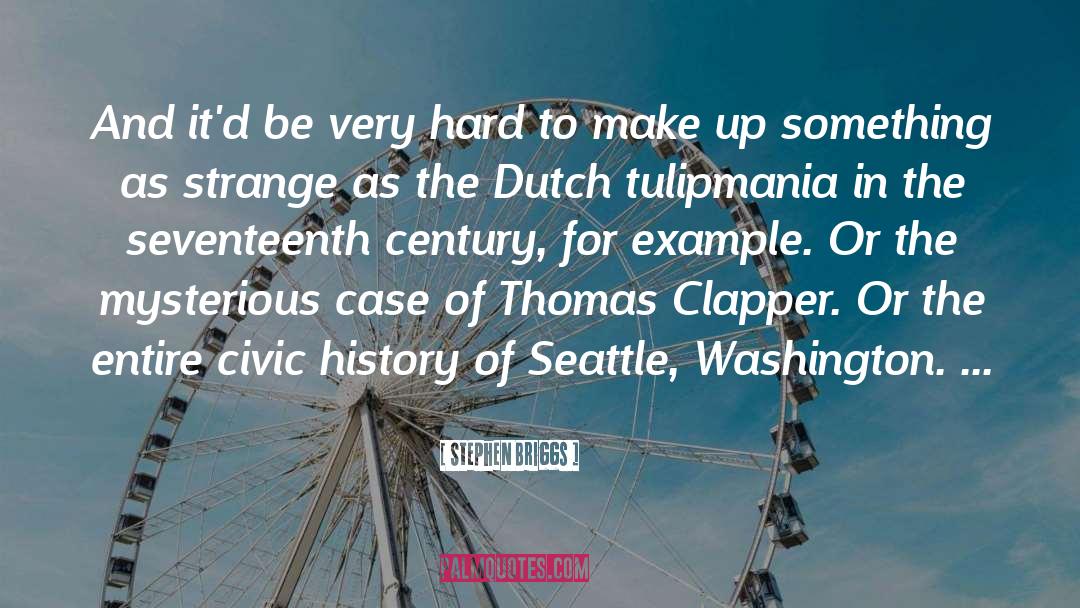
In the seventeenth century the pound sterling was divided into twenty shillings (shortened to s.), and a shilling was divided into twelve pennies, or pence (shortened to d.). So an amount might be expressed as £2 10s 6d, or £2/10/6d. ~ Stephen Inwood
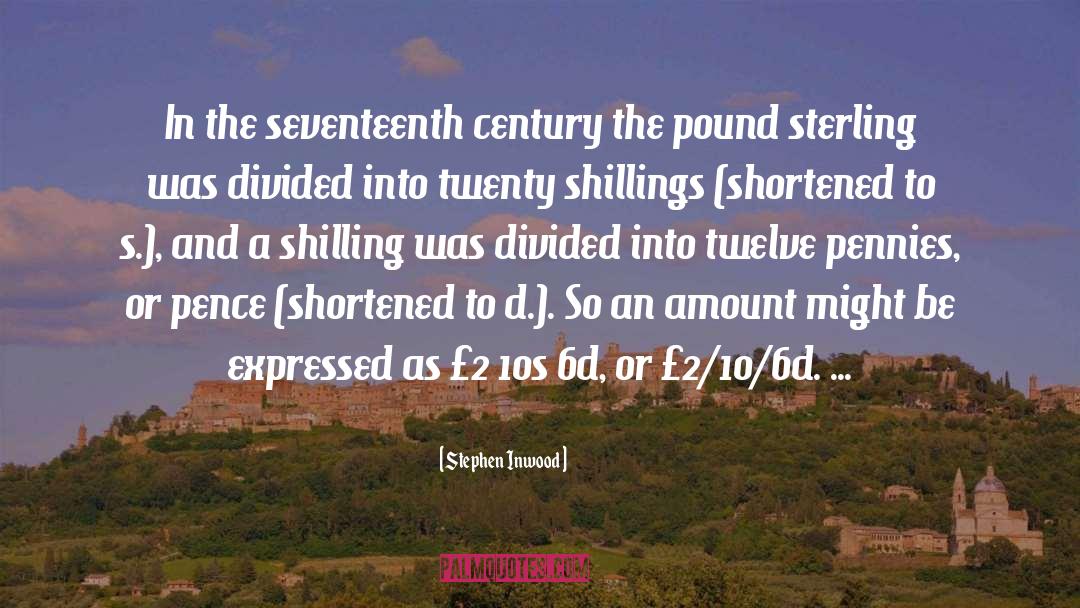
If there is a secret, a carefully guarded secret, to human happiness, it is that one expressed in a seventeenth-century catechism that says, "Man's chief end is to glorify God and to enjoy him forever." The secret to happiness is found in obedience to God. How can we be happy if we are not obedient? How can we be obedient if we do not know what it is we are to obey? Thus the top and the tail of it is that happiness cannot be fully discovered as long as we remain ignorant of God's Word. ~ R.C. Sproul

collectivity, on the other hand, is the place of what the seventeenth-century French philosopher Blaise Pascal calls "divertissement," an untranslatable word which roughly means "distraction" or "diversion": It is the escape from life's problems, and also its invitations, into activities that in ultimate terms are meaningless. It is a constant turning to superficial actions as a way to avoid facing the true realities of human life. The soap operas and situation comedies easily become an addiction. They take the place of the "bread and circuses" of ancient Rome. There was plenty wrong with Roman society and the Roman emperors offered the diversion of food and entertainment to make people forget the banality and meaninglessness of the lives they lived. Our society does much the same and has ever so much more in the way of sophisticated tools for doing so. ~ William H. Shannon
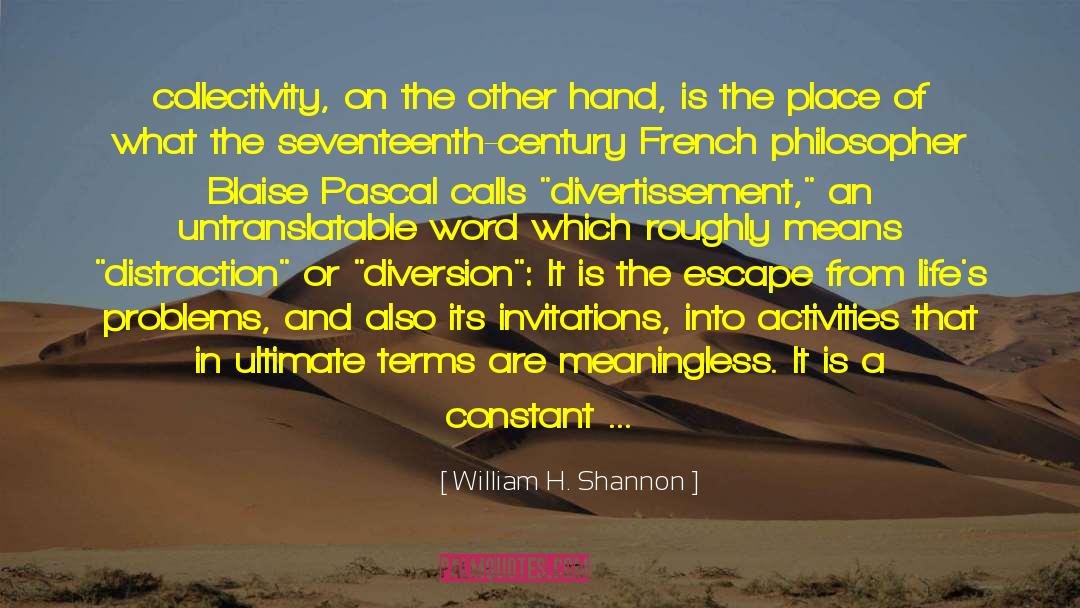
The error I found in the philosophy of Henry George was its cocksureness, its simplicity, and the small value that it placed upon the selfish motives of men. The doctrine was a hang-over from the seventeenth century in France, when the philosophers had given up the idea of God, but still thought that there must be some immovable basis for man's conduct and ideals. In this dilemma they evolved the theory of natural rights. If 'natural rights' means anything it means that the individual rights are to be determined by the conduct of Nature. But Nature knows nothing about rights in the sense of human conception. ~ Clarence Darrow
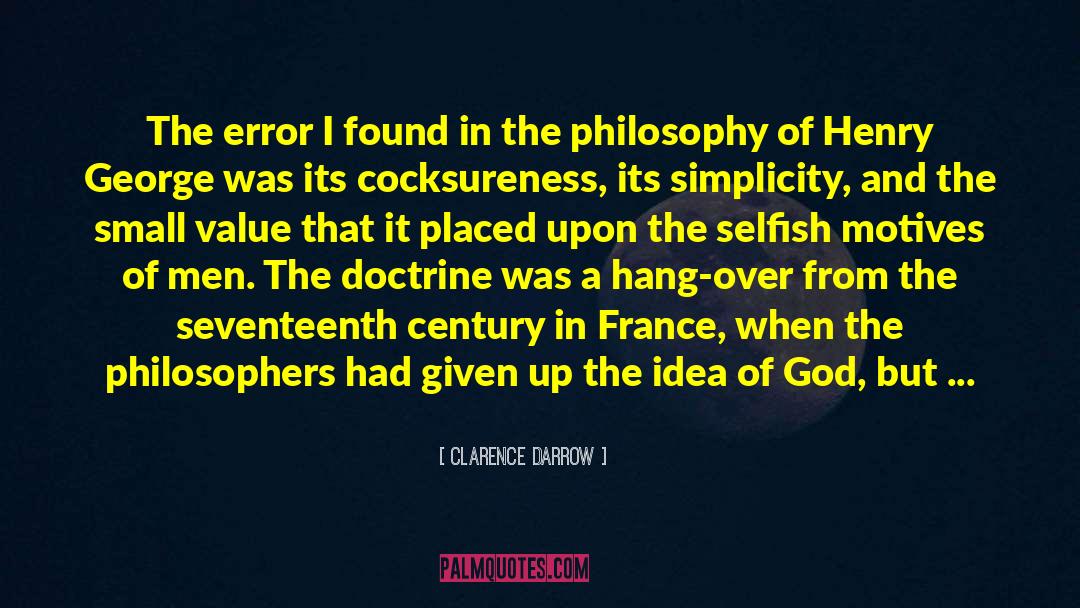
The "gravity train" was devised in the seventeenth century by British scientist Robert Hooke, who presented the idea in a letter to Isaac Newton. The idea has been seriously presented a few times, such as to the Paris Academy of Sciences in the nineteenth century. ~ Stephen Baxter
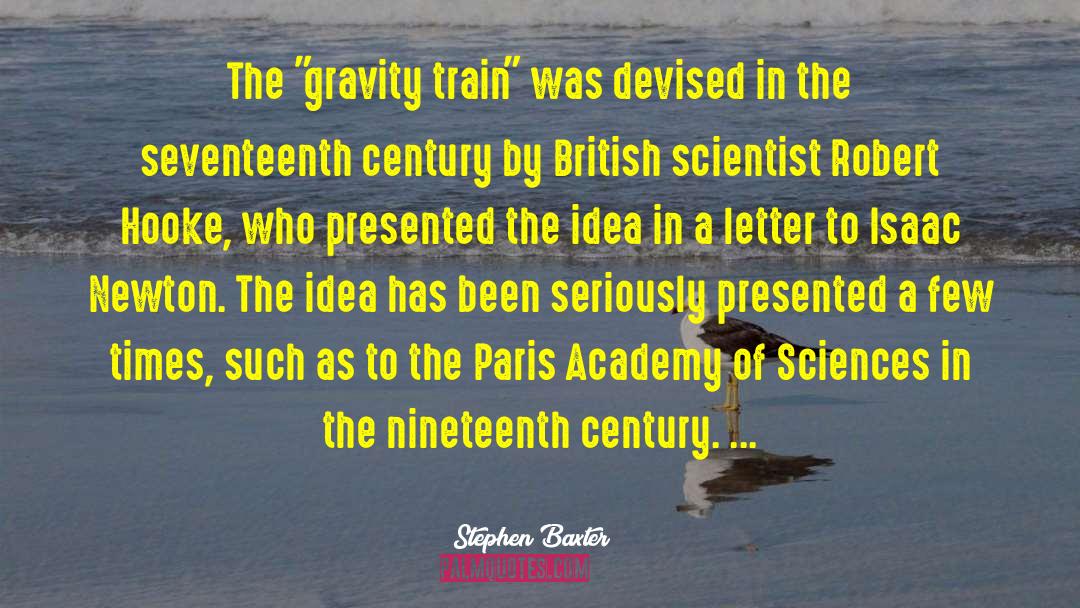
What a lesson, indeed, is all history and all life to the folly and fruitlessness of pride! The Egyptian kings had their embalmed bodies preserved in massive pyramids, to obtain an earthly immortality. In the seventeenth century they were sold as quack medicines, and now they are burnt for fuel! The Egyptian mummies, which Cambyses or time hath spared, avarice now consumeth. Mummy is become merchandise. ~ Edwin Percy Whipple

Compare, for example, seventeenth century writers with those of the eighteenth. What a difference in tone and gait! The former, under a veneer of servility, have the most noble and proud stance… They do not pretend to reign. They merely stand at their place, recognize the place of a superior power beyond, give themselves completely to their writing task, dismiss the temptation of advertising and demonstrate their professional dedication. On the other hand, look at the Voltaire, Diderot and the like: they open well the era of intellectuals, writing stooges as they are, courtiers of princes they flatter and despise at the same time - something they are forced to do as they want to usurp their power… Their courtier nature reveals in everything they do… The whole eighteenth century, both spiritual and plain on a scoundrel background, is libertine, and already pornographic: such is the start of literary mercantilism; people of letters make money out of their writings, pretend to financial independence, and they write garbage to flatter the opinion of their public. ~ Edouard Berth

Roger Williams died sometime during the early months of 1683. Some of what he said and wrote during his lifetime belongs to the seventeenth century. But much of his historical and philosophical record speaks to us across the centuries. ~ Alan E. Johnson

Cannibalism is a problem. In many cases the practice is rooted in ritual and superstition rather than gastronomy, but not always. A French Dominican in the seventeenth century observed that the Caribs had most decided notions of the relative merits of their enemies. As one would expect, the French were delicious, by far the best. This is no surprise, even allowing for nationalism. The English came next, I'm glad to say. The Dutch were dull and stodgy and the Spaniards so stringy, they were hardly a meal at all, even boiled. All this sounds sadly like gluttony. - PATRICK LEIGH FERMOR ~ Felipe Fernandez-Armesto
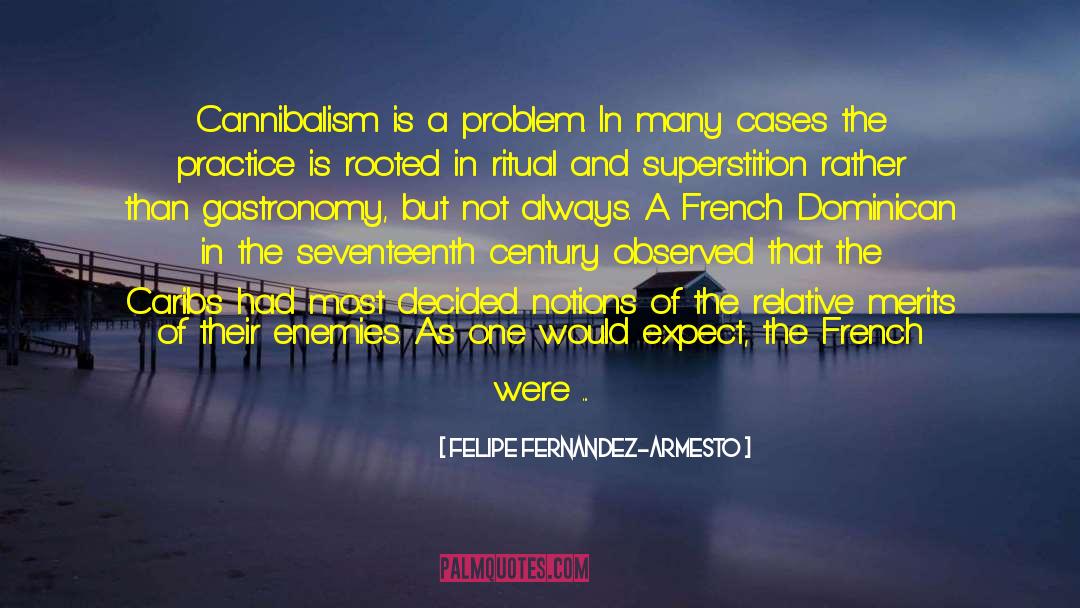
The Restoration did not so much restore as replace. In restoring the monarchy with King Charles II, it replaced Cromwell's Commonwealth and its Puritan ethos with an almost powerless monarch whose tastes had been formed in France.
It replaced the power of the monarchy with the power of a parliamentary system - which was to develop into the two parties, Whigs and Tories - with most of the executive power in the hands of the Prime Minister. Both parties benefited from a system which encouraged social stability rather than opposition.
Above all, in systems of thought, the Restoration replaced the probing, exploring, risk-taking intellectual values of the Renaissance. It relied on reason and on facts rather than on speculation. So, in the decades between 1660 and 1700, the basis was set for the growth of a new kind of society. This society was Protestant (apart from the brief reign of the Catholic King James II, 1685-88), middle class, and unthreatened by any repetition of the huge and traumatic upheavals of the first part of the seventeenth century. It is symptomatic that the overthrow of James II in 1688 was called The 'Glorious' or 'Bloodless' Revolution. The 'fever in the blood' which the Renaissance had allowed was now to be contained, subject to reason, and kept under control. With only the brief outburst of Jacobin revolutionary sentiment at the time of the Romantic poets, this was to be the political context in the United Kingdom for two centuries or more. ~ Ronald Carter
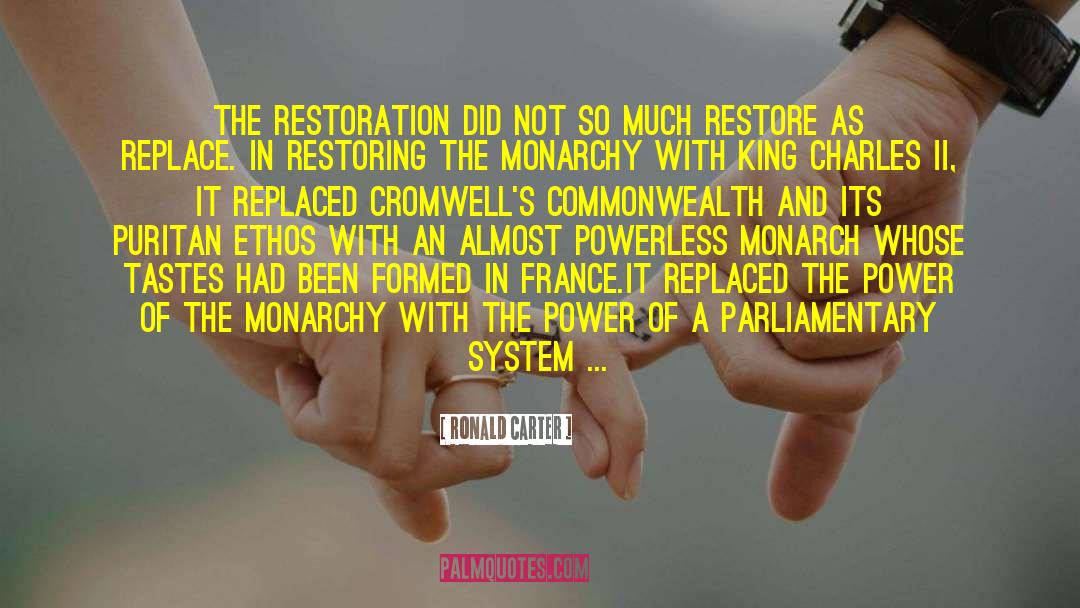
New power meant a new relation to time. The lending of money against interest was considered "against nature" by the
Church: money naturally was a means of exchange to buy necessities, not a capital that could work or bear fruits. During the seventeenth century even the Church abandoned this view-though reluctantly
to accept the fact that Christians had become capitalist merchants. Time became like money: I now can have a few hours before lunch; how shall I spend time? . I am
short of time so I can't afford to spend that much time on a committee; it's not worth the time ... It world be a waste of time; I'd rather save an hour ~ Ivan Illich
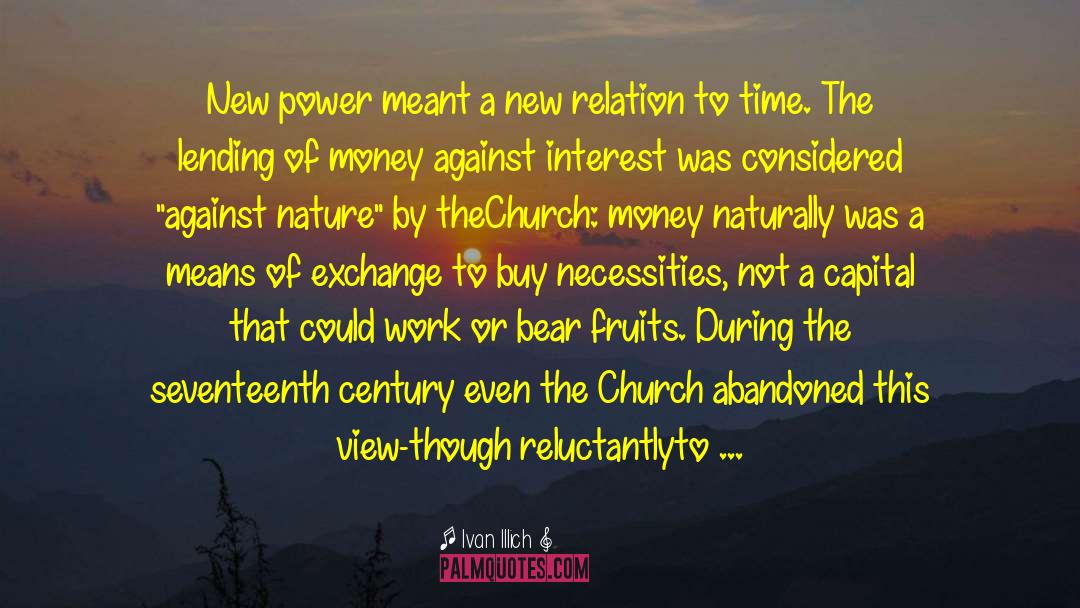
Let me repeat: the stakes are high. We must confront one of the most massive pseudo-evidences in recent intellectual history: the belief, rampant in Europe since only two or three centuries ago, in the existence of 'religions' - and more than that, against the unverified faith in the existence of faith. Faith in the existence of 'religion' is the element that unites believers and non-believers, in the present as much as in the past. It displays a single-mindedness that would make any prefect of the Congregation for the Doctrine of the Faith in Rome green with envy. No one who overcame religion ever doubted its existence, even if they opposed every single one of its dogmas. No denial ever confronted the denier with the question of whether its name was justified, and whether it had any lasting value in such a form. It is only because society has grown accustomed to a comparatively recent fiction - it did not come into use until the seventeenth century - that one can speak today of a 'return of religion'.' It is the unbroken faith in religion as a constant and universal factor which can vanish and return that forms the foundation of the current legend. ~ Peter Sloterdijk
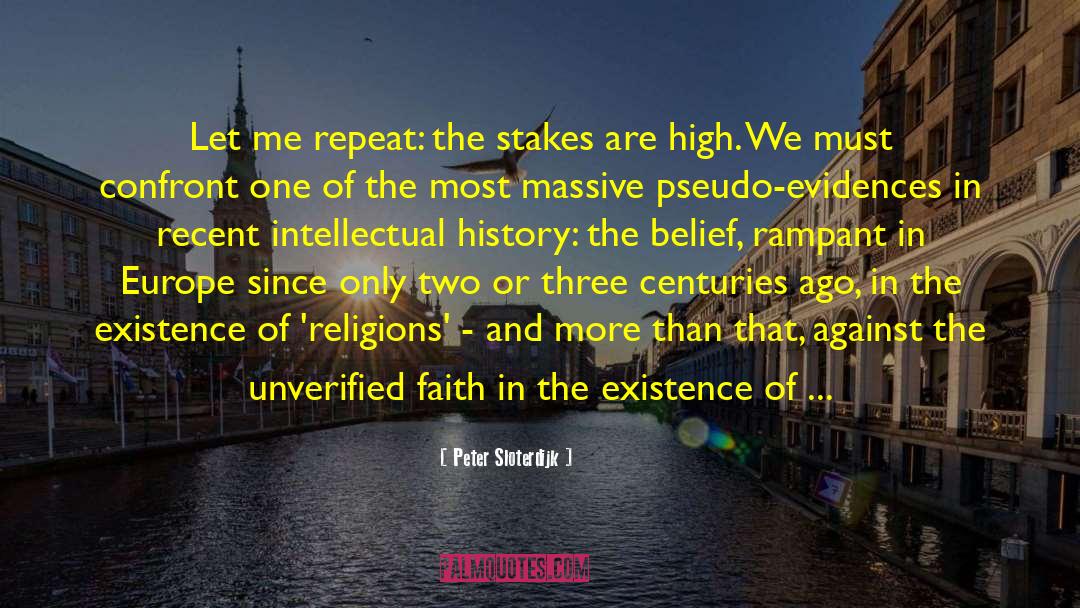
In The Great Stagnation, Cowen bemoaned the lack of big technological advances and argued that the American economy has slowed and wages have been depressed as a result. "In a figurative sense, the American economy has enjoyed lots of low-hanging fruit since at least the seventeenth century, whether it be free land, lots of immigrant labor, or powerful new technologies," he wrote. "Yet during the last forty years, that low-hanging fruit started disappearing, and we started pretending it was still there. We have failed to recognize that we are at a technological plateau and the trees are more bare than we would like to think. That's it. That is what has gone wrong." In ~ Ashlee Vance
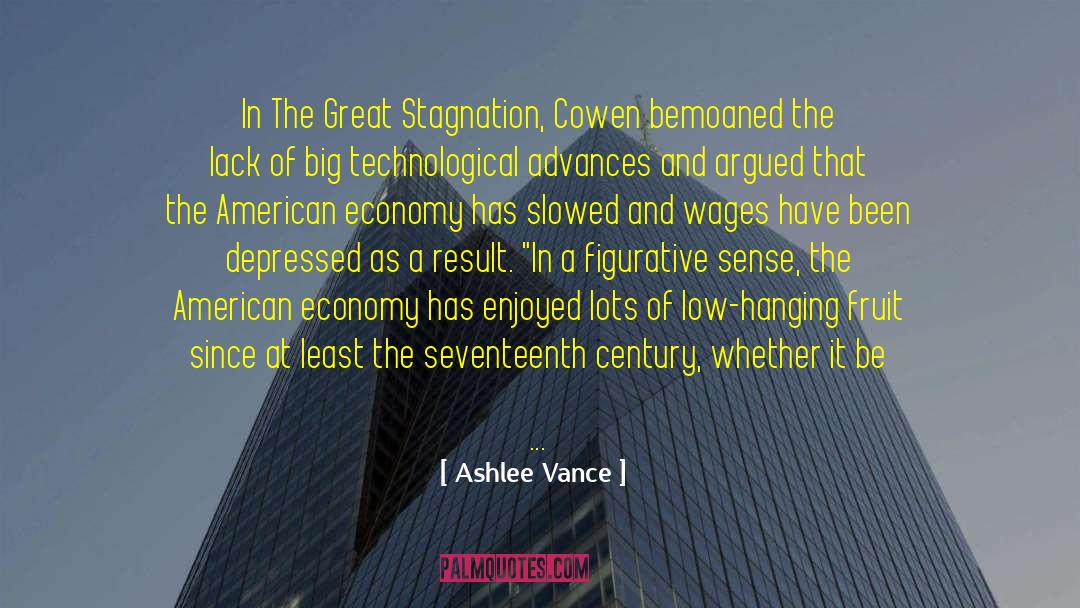
Starting in the seventeenth century, the general theory of extreme values - maxima and minima - has become one of the systematic integrating principles of science. ~ Richard Courant

Condon, quick on his feet, replied that the accusation was untrue. He was not a revolutionary in physics. He raised his right hand: "I believe in Archimedes' Principle, formulated in the third century B.C. I believe in Kepler's laws of planetary motion, discovered in the seventeenth century. I believe in Newton's laws.…" And on he went, invoking the illustrious names of Bernoulli, Fourier, Ampère, Boltzmann, and Maxwell. ~ Carl Sagan

Even by the end of the seventeenth century, fifty years before our starting point, there was no shortage of people in Europe who felt that the Christian religion had been gravely discredited. Protestants and Catholics had been killing each other in the hundreds of thousands, or millions, for holding opinions that no one could prove one way or the other. The observations of Kepler and Galileo transformed man's view of the heavens, and the flood of discoveries from the New World promoted an interest in the diversity of customs and beliefs found on the other side of the Atlantic. It was obvious to many that God favored diversity over uniformity and that Christianity and Christian concepts - like the soul and a concentration on the afterlife - were not necessarily crucial elements since so many lived without them. ~ Peter Watson
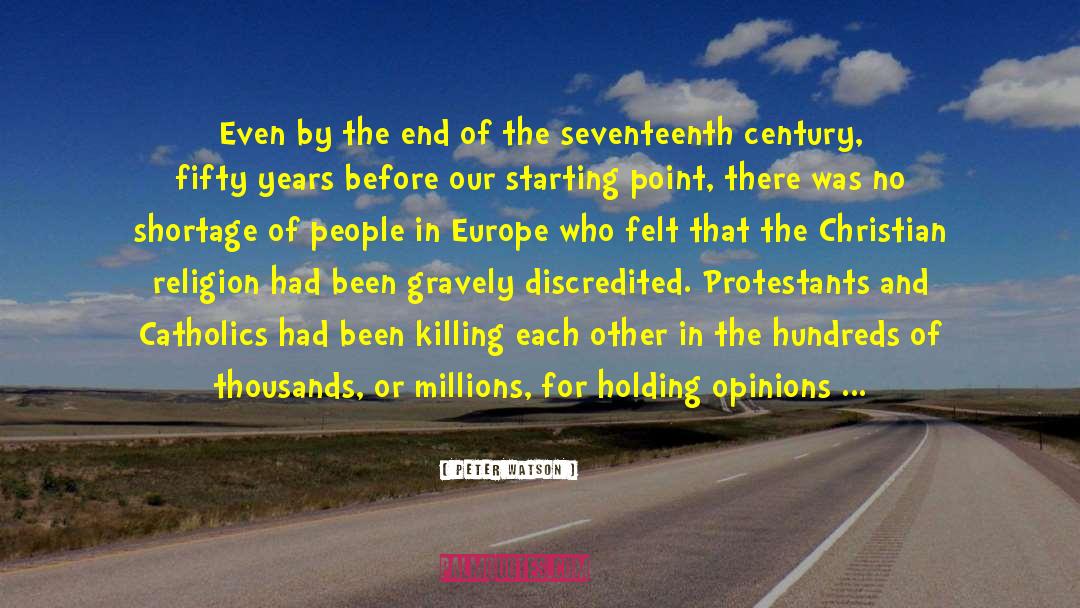
Romans 8:16 tells us that the Spirit bears witness to our hearts that we are children of God. Part of the mission of the Spirit is to tell you about God's love for you, his delight in you, and the fact that you are his child. These things you may know in your head, but the Holy Spirit makes them a fiery reality in your life. Thomas Goodwin, a seventeenth-century Puritan pastor, wrote that one day he saw a father and son walking along the street. Suddenly the father swept the son up into his arms and hugged him and kissed him and told the boy he loved him - and then after a minute he put the boy back down. Was the little boy more a son in the father's arms than he was down on the street? Objectively and legally, there was no difference, but subjectively and experientially, there was all the difference in the world. In his father's arms, the boy was experiencing his sonship. ~ Timothy Keller

Even though Pope Urban VIII reversed the pronouncements of his predecessors by declaring slavery unacceptable in the mid-seventeenth century, the vast majority of Protestant Christians in America considered slavery and white supremacy to be absolutely consistent with "biblical" Christianity. It would take American Protestants over a hundred years to make slavery history. Even then, they would find ways to cleverly camouflage the old Doctrine of Discovery and its white supremacist scaffolding under distinctly American terms like Manifest Destiny and American exceptionalism, terms still celebrated in many sectors of US society today. Professor ~ Brian D. McLaren

When the Europeans conquered America, they opened gold and silver mines and established sugar, tobacco and cotton plantations. These mines and plantations became the mainstay of American production and export. The sugar plantations were particularly important. In the Middle Ages, sugar was a rare luxury in Europe. It was imported from the Middle East at prohibitive prices and used sparingly as a secret ingredient in delicacies and snake-oil medicines. After large sugar plantations were established in America, ever-increasing amounts of sugar began to reach Europe. The price of sugar dropped and Europe developed an insatiable sweet tooth. Entrepreneurs met this need by producing huge quantities of sweets: cakes, cookies, chocolate, candy, and sweetened beverages such as cocoa, coffee and tea. The annual sugar intake of the average Englishman rose from near zero in the early seventeenth century to around eighteen pounds in the early nineteenth century. ~ Yuval Noah Harari
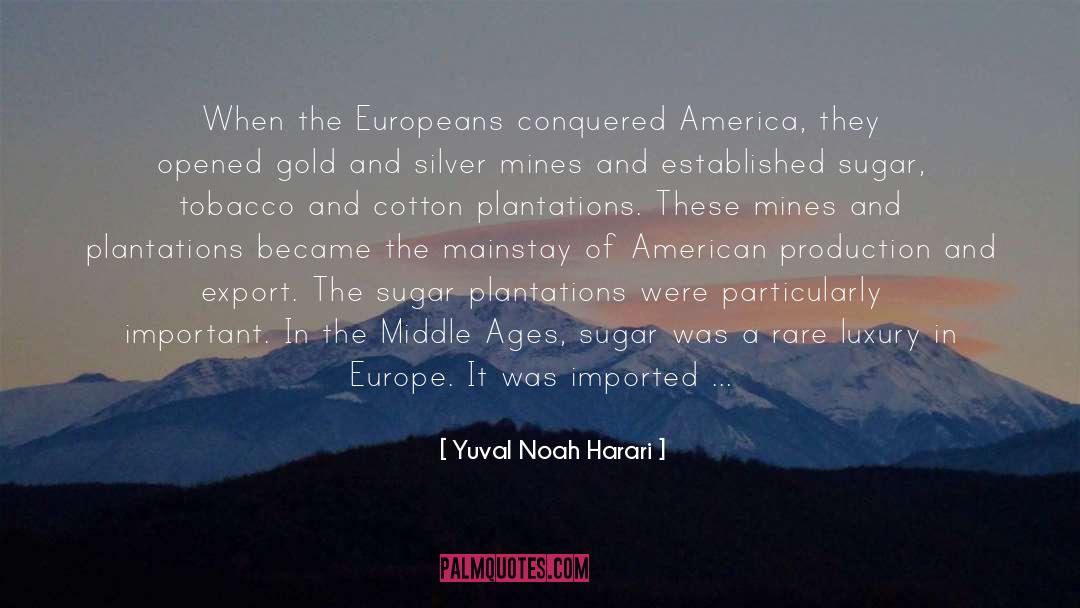
If she had ever once in her life given the realities of life in seventeenth-century Bohemia a fleeting thought - and she most certainly had not - she would have pictured a world of superstition and suffering where obscenely rich and powerful aristocrats oppressed the miserable mass of grimy peasants whose lives were nasty, brutish, and short. Yet the folk she observed bustling around her, while admittedly grimy and short, seemed a fairly happy lot - judging solely from the air of amiable bonhomie permeating the Old Town square. Everywhere she looked, people were smiling, laughing, greeting one another with formal handshakes and kisses. ~ Stephen R. Lawhead
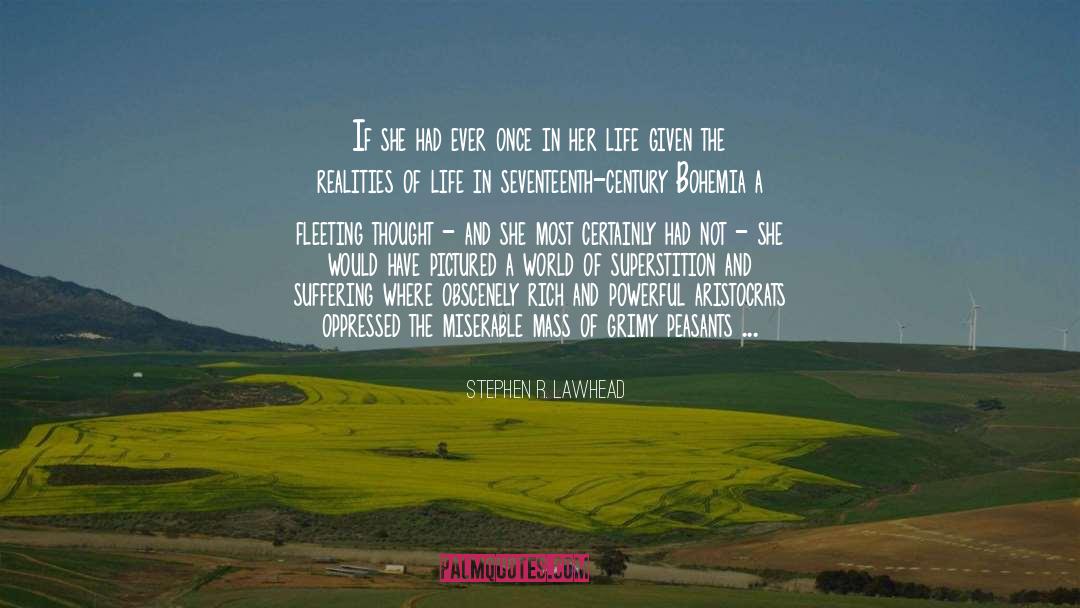
In a letter, once, he drew me a picture, or allegorical diagram, imitated from the well-known frontispiece of Hobbes's Leviathan, which showed a Leviathan of human values. In the head there stood a figure labeled SAINT. In the heart, a figure labeled HERO. Twittering round the huge figure there was an insect-like object dressed as a man of fashion of the seventeenth century and labeled GENTLEMAN; from its mouth there issued a balloon in which was written in tiny letters: 'and where do I come in?'. Mirabel, he went on to say, was no part of the Everlasting Gospel, a phrase of Blake's that he had his own meaning for. Perhaps the hunger for magnitude that made him admire Gilgamesh and the Edda, and made Spenser and Milton his favourites, disabled him from an appreciation, which I could not deny, for a world of elegant cuckoldry and cynic wit, so seemingly heartless, a trifler's scum of humanity that sought to be taken for its cream. ~ Jocelyn Gibb

But it doesn't happen that way, I keep telling myself knowingly and sadly. Only in our fraternity pledges and masonic inductions, our cowboy movies and magazine stories, not in our real-life lives. For, the seventeenth-century humanist to the contrary, each man is an island complete unto himself, and as he sinks, the moving feet go on around him, from nowhere to nowhere and with no time to lose. The world is long past the Boy Scout stage of its development; now each man dies as he was meant to die, and as he was born, and as he lived: alone, all alone. Without any God, without any hope, without any record to show for his life.
("New York Blues") ~ Cornell Woolrich
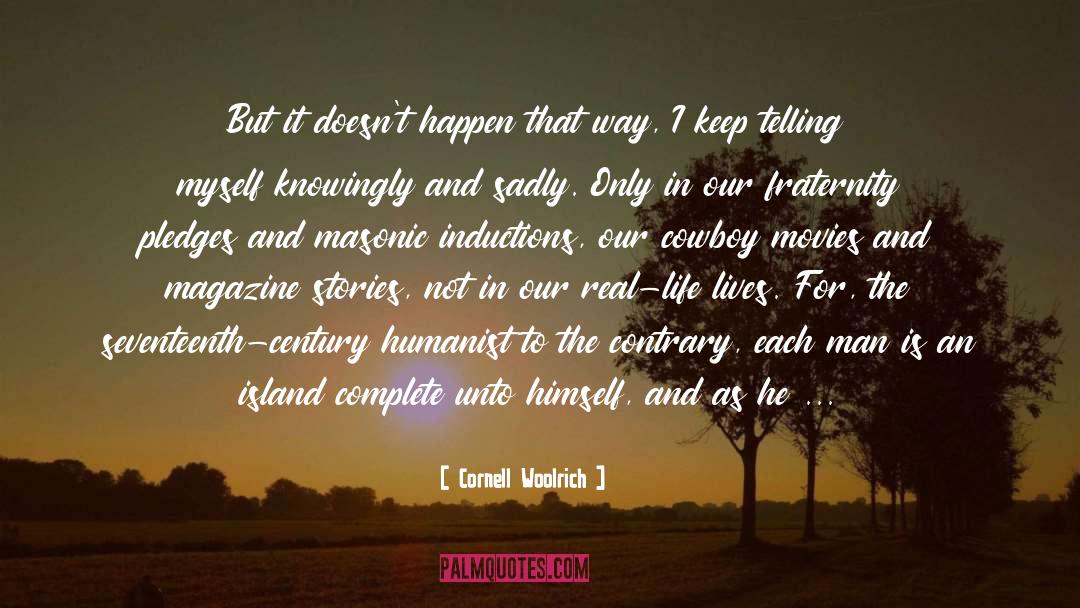
To visit a modern Concentrated Animal Feeding Operation (CAFO) is to enter a world that for all its technological sophistication is still designed on seventeenth-century Cartesian principles: Animals are treated as machines - "production units" - incapable of feeling pain. Since no thinking person can possibly believe this anymore, industrial animal agriculture depends on a suspension of disbelief on the part of the people who operate it and a willingness to avert one's eyes on the part of everyone else. ~ Michael Pollan
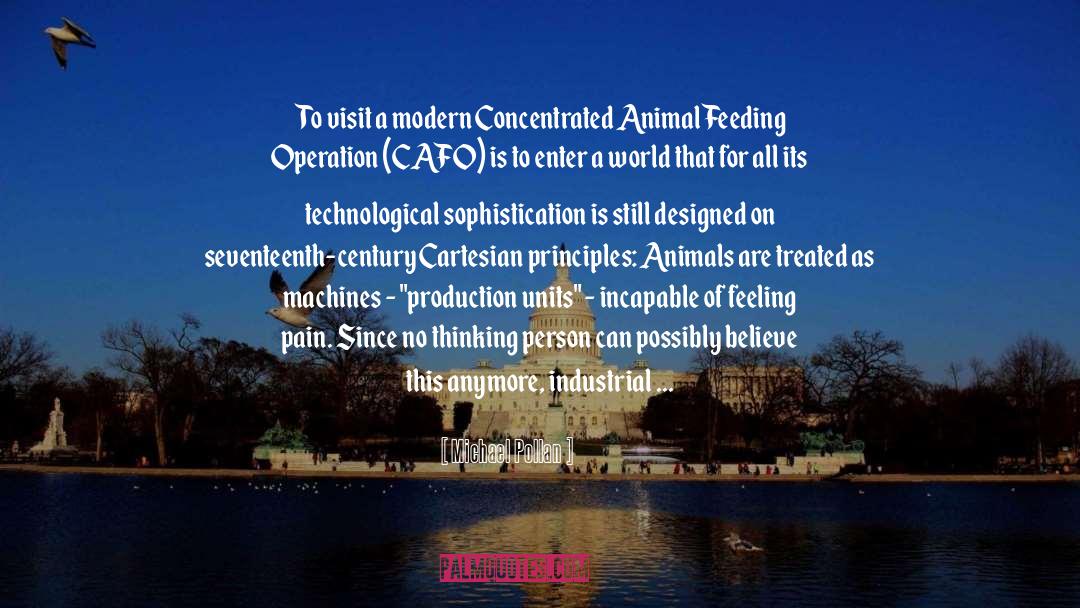
the gold standard was incapable of preventing the sort of financial booms and busts that were, and continue to be, such a feature of the economic landscape. These bubbles and crises seem to be deep-rooted in human nature and inherent to the capitalist system. By one count there have been sixty different crises since the early seventeenth century - the first documented bank panic can, however, be dated to A.D. 33 when the Emperor Tiberius had to inject one million gold pieces of public money into the Roman financial system to keep it from collapsing. ~ Liaquat Ahamed
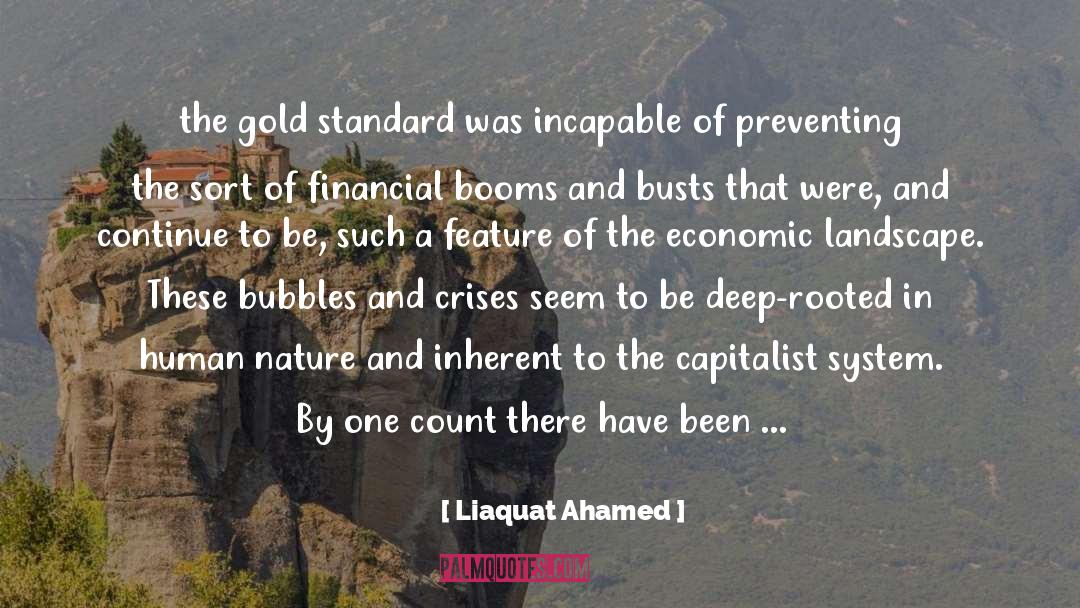
The radicals assumed that acting was more important than speaking. Talking and writing books, Winstanley insisted, is 'all nothing and must die; for action is the life of all, and if thou dost not act, thou dost nothing.' It is a thought worth pondering by those who read books about the seventeenth-century radicals, no less than by those who write them. Were you doers or talkers only? Bunyan asked his generation. What canst thou say? ~ Christopher Hill

A seventeenth-century house can be recognized by its steep roof, massive central chimney and utter porchlessness. Some of those houses have a second-story overhang, emphasizing their medieval look. ~ John Updike
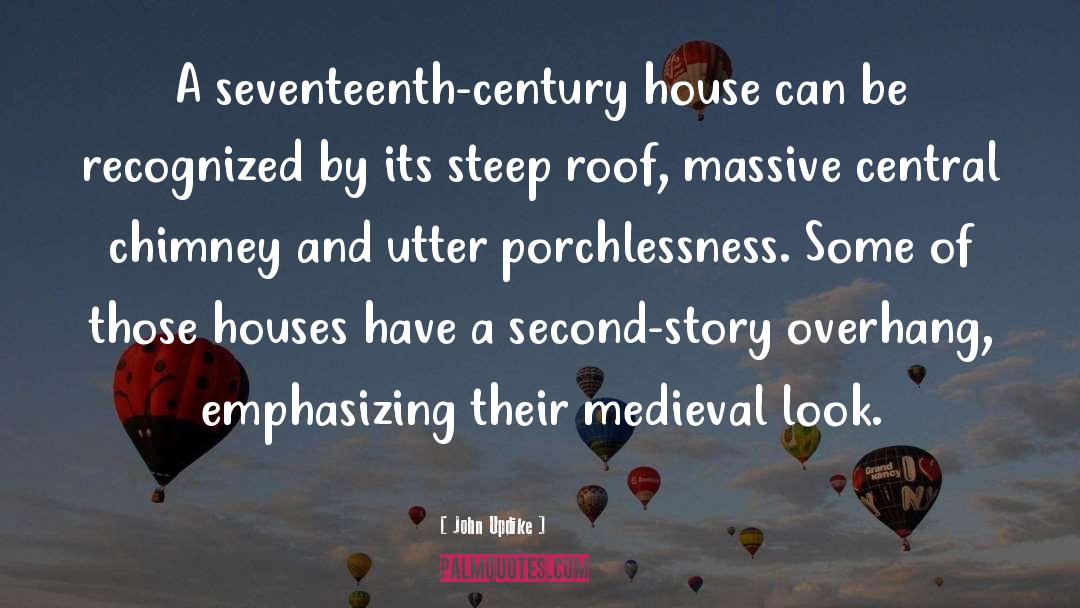
What Galileo and Newton were to the seventeenth century, Darwin was to the nineteenth. ~ Bertrand Russell
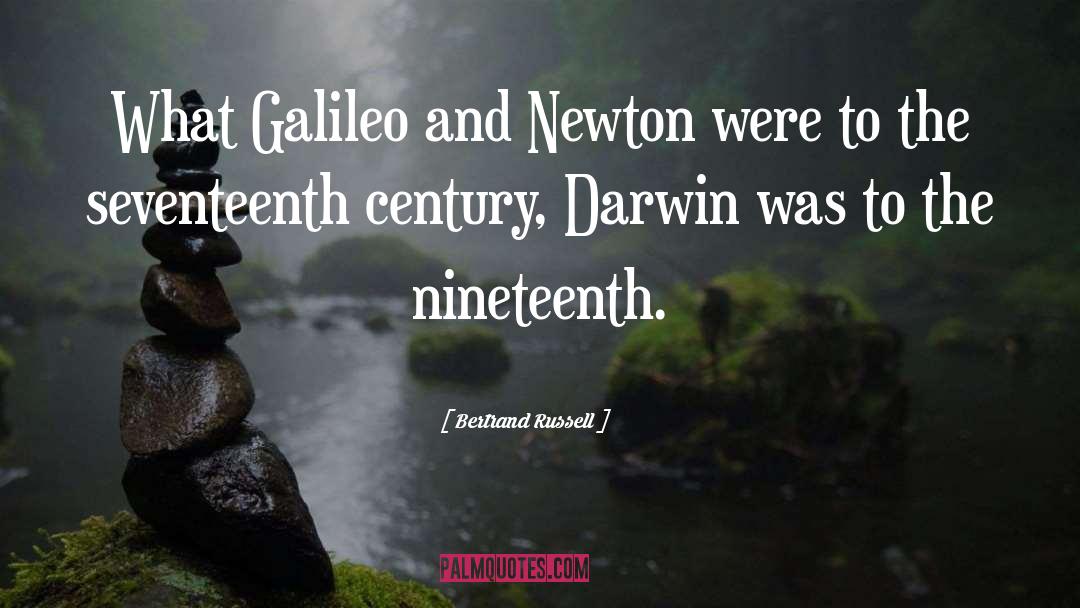
Instead, power went to those who made things happen: businessmen and local magistrates. Over time, human nature being what it is, these men would create a kind of nobility, sometimes even buying titles from cash-poor foreigners, but this in itself underscores the point. Upward mobility was part of the Dutch character: if you worked hard and were smart, you rose in stature. Today that is a byword of a healthy society; in the seventeenth century it was weird. ~ Russell Shorto
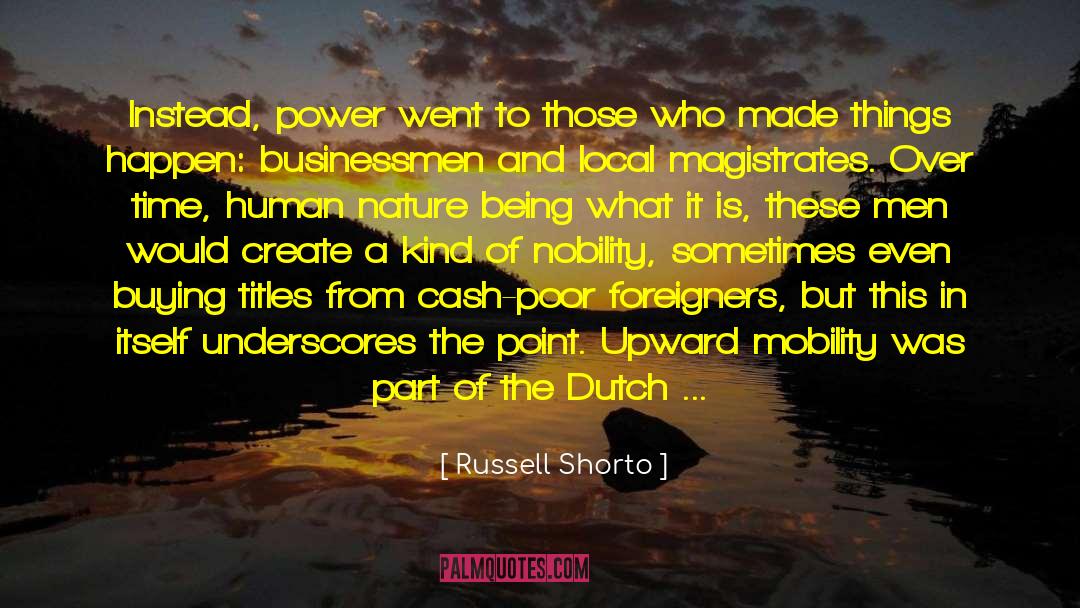
Jeanne de Chantal, seventeenth-century founder of the Order of the Visitation, said, No matter what happens, be gentle with yourself. ~ Shane Claiborne

The classical argument for why a supposedly decent and moral creature like Homo sapiens can mistreat and even extirpate other species rests upon an extreme position in a continuum. The Cartesian tradition, formulated explicitly in the seventeenth century, but developed in "folk" and other versions throughout human history no doubt, holds that other animals are little more than unfeeling machines, with only humans enjoying "consciousness," however defined. ~ Stephen Jay Gould
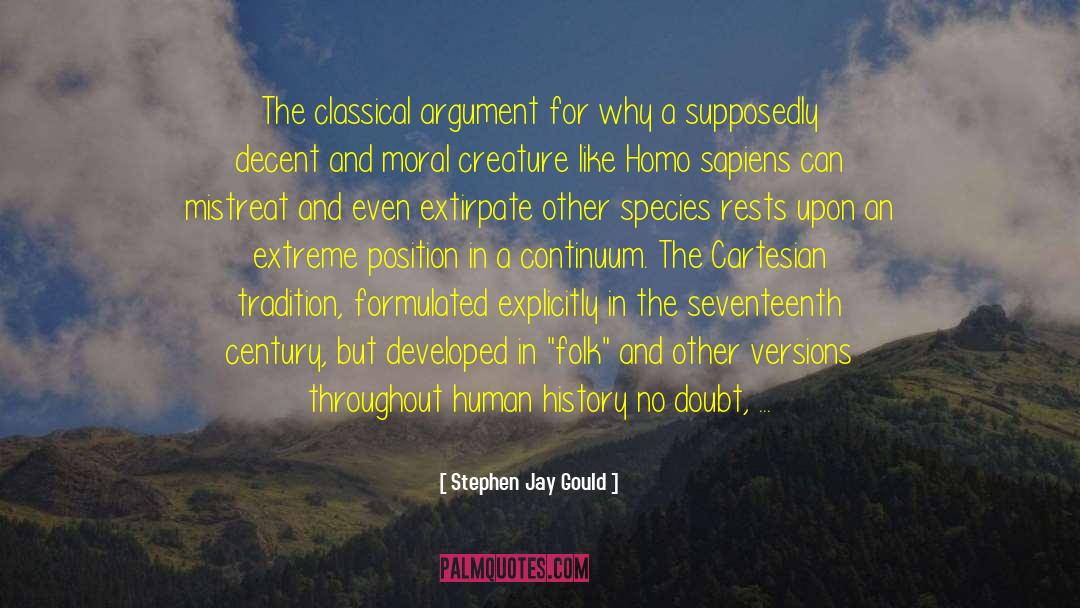
As the seventeenth-century French philosopher Montaigne once said, "My life has been filled with terrible misfortune, most of which never happened. ~ Kristin Neff

Captain Jack, that volatile Modoc, seems to have been handled still more causally. After being hanged and buried, Jack was exhumed, embalmed, and exhibited at carnivals: admission ten cents. How many instances of such sensibility one chooses to catalogue may be limited by the amount of time spent turning over musty pages. During the seventeenth century, Robert Cavalier, Sieur de La Salle, came upon a wood plank near the ruins of Ft. Crèvecoeur deep in the wilderness of the New World, upon which a French deserter had printed: NOUS SOMMES TOUS SAUVAGES ~ Evan S. Connell
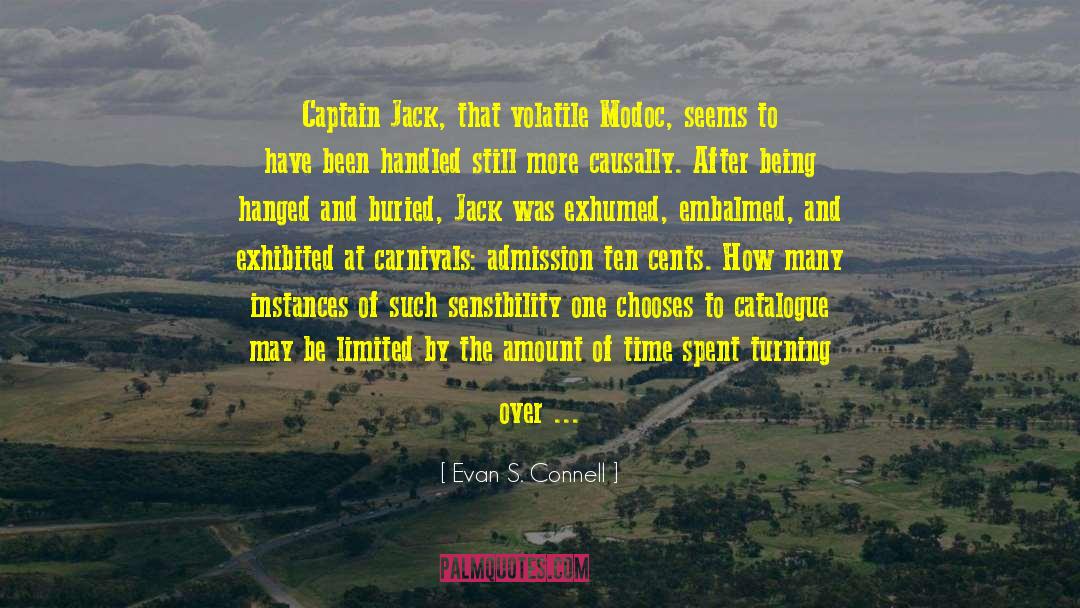
The walls were draped with banners covered with cabalistic signs, an abundance of owls of all kinds, scarabs and ibises, and Oriental divinities of uncertain origin. Near the rear wall was a dais, a proscenium of burning torches held up by rough logs, and in the background an altar with a triangular altarpiece and statuettes of Isis and Osiris. The room was ringed by an amphitheater of figures of Anubis, and there was a portrait of Cagliostro (it could hardly have been of anyone else, could it?), a gilded mummy in Cheops format, two five-armed candelabra, a gong suspended from two rampant snakes, on a podium a lectern covered by calico printed with hieroglyphics, and two crowns, two tripods, a little portable sarcophagus, a throne, a fake seventeenth-century fauteuil, four unmatched chairs suitable for a banquet with the sheriff of Nottingham, and candles, tapers, votive lights, all flickering very spiritually. ~ Umberto Eco
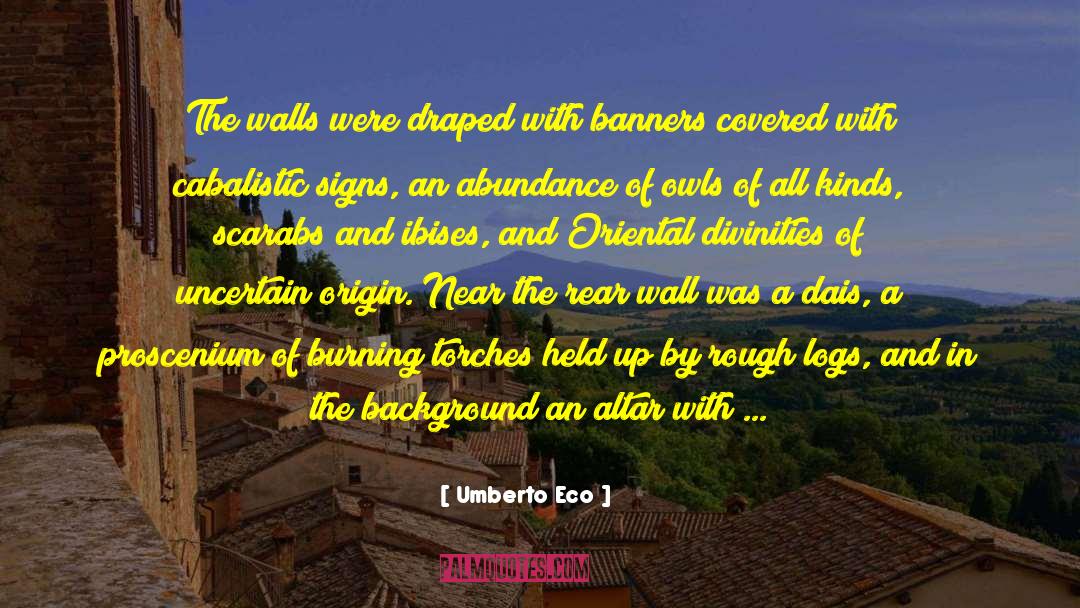
Menaced by environmental problems, torn by struggles between the tiny coterie of wealthy Spaniards at the center and a teeming, fractious polyglot periphery, battered by a corrupt and inept civic and religious establishment, troubled by a past that it barely understood - to the contemporary eye, sixteenth- and seventeenth-century Mexico City looks oddly familiar. In its dystopic way, it was an amazingly contemporary place, unlike any other then on the planet. It was the first twenty-first-century city, the first of today's modern, globalized megalopolises. ~ Charles C. Mann
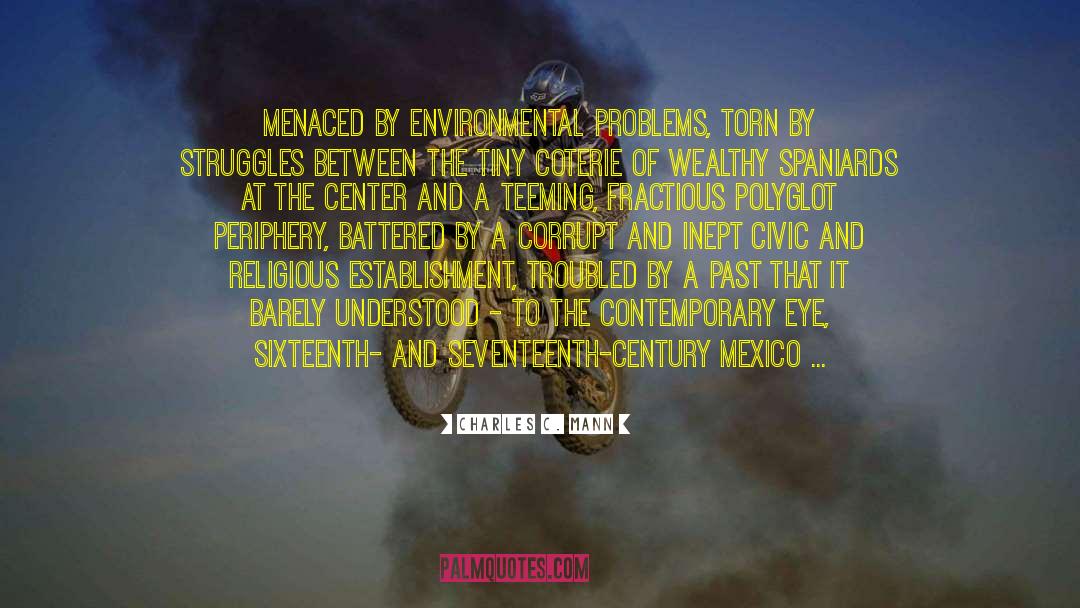
You're so seventeenth century. ~ Susan Catalano
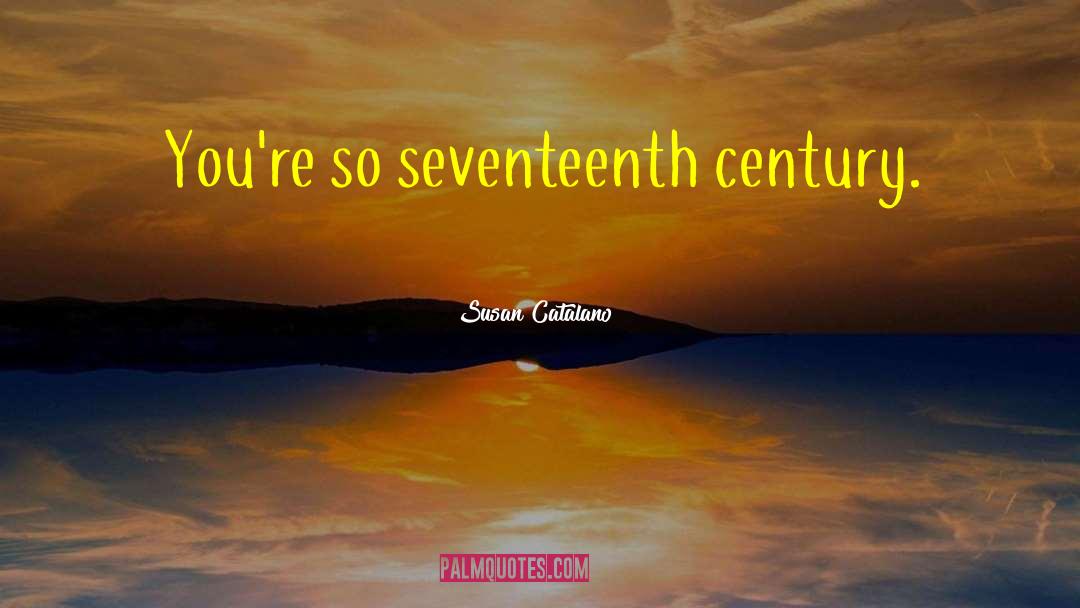
It is as if, to every period of history, there corresponded a privileged age and a particular division of human life: "youth" is the privileged age of the seventeenth century, childhood of the nineteenth, adolescence of the twentieth. ~ Philippe Aries
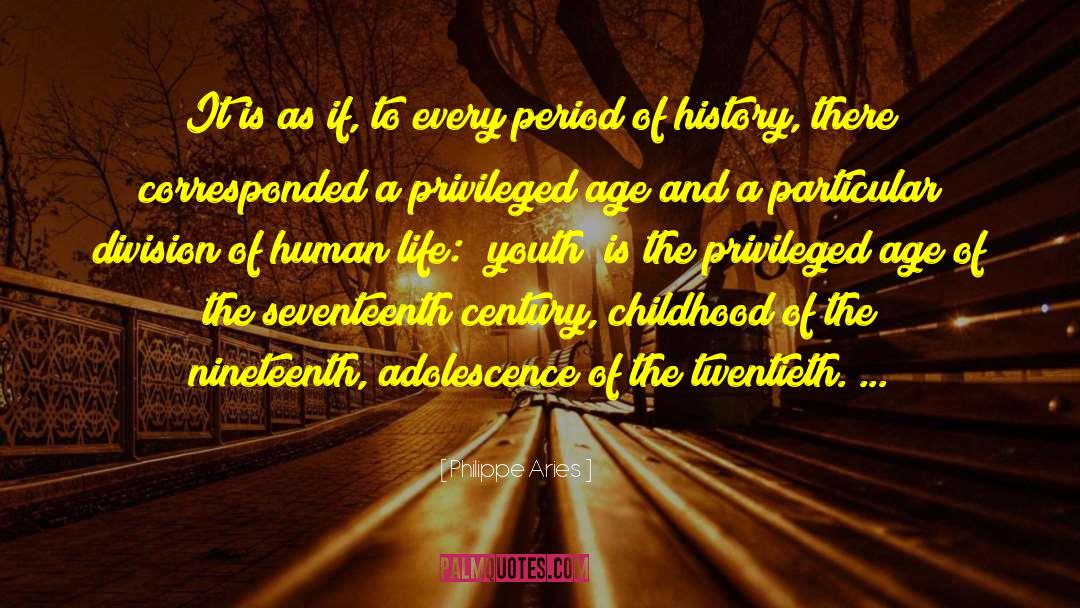
As late as the seventeenth century, monarchs owned so little furniture that they had to travel from palace to palace with wagon-loads of plate and bedspreads, of carpets and tapestries. ~ Aldous Huxley

Unable either to practice science without the Principia or to make that work conform to the corpuscular standards of the seventeenth century, scientists gradually accepted the view that gravity was indeed innate ~ Thomas S. Kuhn

Almost everything that distinguishes the modern world from earlier centuries is attibutable to science, which achieved its most spectacular triumphs in the seventeenth century. ~ Bertrand Russell
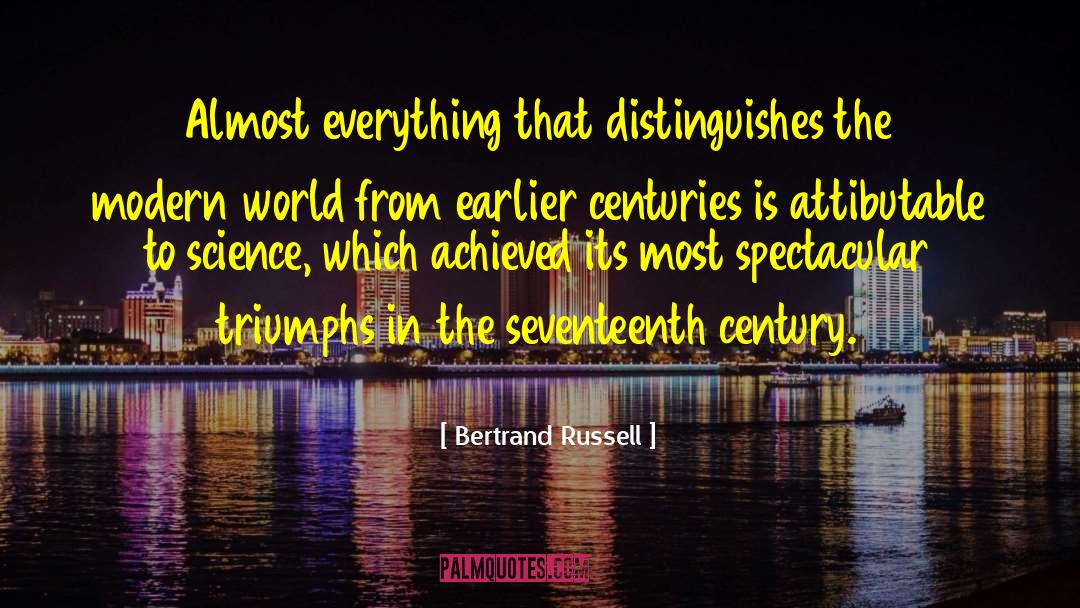
The falseness of the seventeenth century became a large measure of the truth by the nineteenth. Money made the man, or at least went a long way toward doing so; and death became the occasion for a final accounting, a stocktaking of worldly success. Of course, there were other metrics: virtue, martyrdom, political standing, fraternal ties. But it took money to publicize them. The funeral became more and more a standardized commodity whose cost could be matched with exquisite precision to the class and degree of 'respectability' of the deceased. When one bought a funeral, one bought a more or less splendid parade, each additional bauble, each horse, each feather or set of nails adding to the base price. Bit by bit, finery accumulated, and by looking at the account books of an undertaker who specialized in pauper funerals, we can begin to see the bounds of decency in death. ~ Thomas W. Laqueur
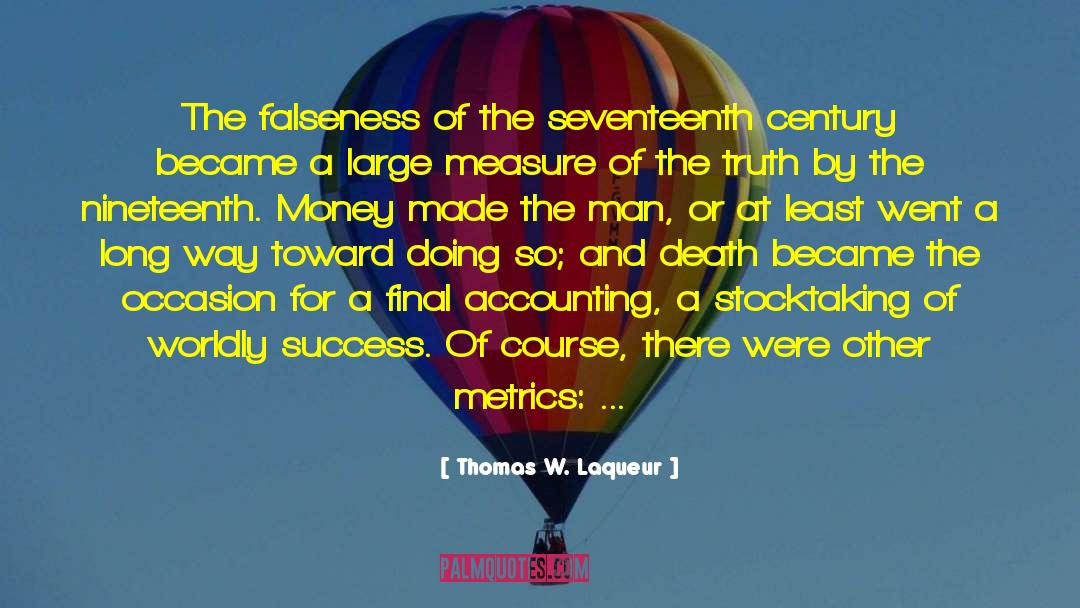
The German astronomer Johannes Kepler coined the term "camera obscura" in the early seventeenth century, but by then the phenomenon had been known for millennia; in fact, it is perhaps the oldest known optical illusion. Some form of camera obscura was most likely behind a popular illusion performed in ancient Greece and Rome, in which spectral images were cast upon the smoke of burning incense by performers using concave metal mirrors - hence the expression "smoke and mirrors. ~ Jennifer Ouellette

A scrap of seventeenth-century sunlight compressed into dots and pixels, ~ Donna Tartt
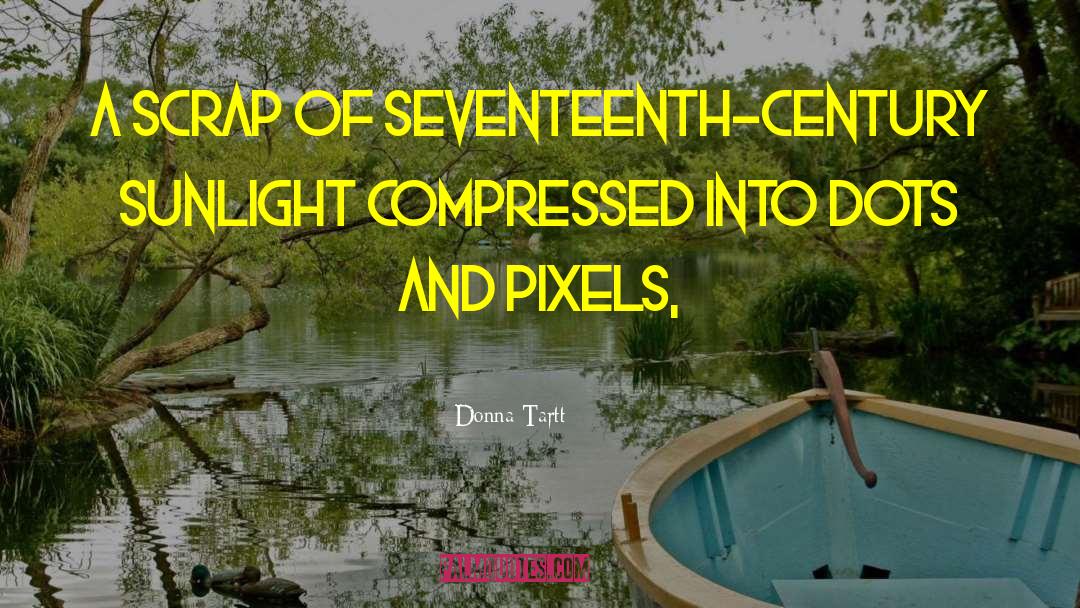
By the time of the arrival of Islam in the early seventeenth century CE, what we now call the Middle East was divided between the Persian and Byzantine empires. But with the spread of this new religion from Arabia, a powerful empire emerged, and with it a flourishing civilization and a glorious golden age.
Given how far back it stretches in time, the history of the region
and even of Iraq itself
is too big a canvas for me to paint. Instead, what I hope to do in this book is take on the nonetheless ambitious task of sharing with you a remarkable story; one of an age in which great geniuses pushed the frontiers of knowledge to such an extent that their work shaped civilizations to this day. ~ Jim Al-Khalili

The seventeenth-century Jewish philosopher Spinoza observed: "I have often wondered that persons who make boast of professing the Christian religion - namely love, joy, peace, temperance, and charity to all men - should quarrel with such rancorous animosity and display daily towards one another such bitter hatred, that this, rather than the virtues which they profess, is the readiest criteria of their faith. ~ Douglas J. Moo

I'm working on this book on the trial of Socrates. It started out with the idea of the problem of freedom of thought...and expression...I started by spending a year on the English Seventeenth Century Revolutions, and I had a fascinating time. And then I felt I couldn't understand the English Seventeenth Century Revolutions without understanding the Reformation. When I got to the Reformation, I felt that I had to understand the premonitory movements that began in the Middle Ages. When I got there, I felt I had to understand the classical period." (quoted in Andrew Patner, I. F. Stone: A Portrait, p. 21) ~ I. F. Stone
